#I actually like the economic changes and how that can play with colonies
Explore tagged Tumblr posts
Text
You know everyone (small handful of strange people who like vicky 3) is talking about these new Colonial tags and whats the point of them.
Which in my mind if they states are incorporated in the tags and collecting taxes that could be awesome. You could get the overlords cut of the money, and not spend the Beaureaucracy on states that dont give you income for 20 years.
Assuming that is how they work Im not 100% sure.
#but yeah the changes are pretty crazy.#I actually like the economic changes and how that can play with colonies#No liqour was not cheap in Amsterdam because dutch people w ere drinking moonshine made in a hut in Sumatra.
0 notes
Text
So "Voting Is Not Harm Reduction" is an Indigenous essay that you can read here:
To quote:
"We don’t dismiss the reality that, on the scale of U.S. settler colonial violence, even the slightest degree of harm can mean life or death for those most vulnerable. What we assert here is that the entire notion of “voting as harm reduction” obscures and perpetuates settler-colonial violence, there is nothing “less harmful” about it, and there are more effective ways to intervene in its violences. Voting won’t undue settler colonialism, white supremacy, hetero-patriarchy, or capitalism. Voting is not a strategy for decolonization. What do we get out of voting that we cannot directly provide for ourselves and our people? What ways can we organize and make decisions that are in harmony with our diverse lifeways? What ways can the immense amount of material resources and energy focused on persuading people to vote be redirected into services and support that we actually need? What ways can we direct our energy, individually and collectively, into efforts that have immediate impact in our lives and the lives of those around us?"
What I, as a Native person, really hate about this stance is that it very clearly contradicts itself: the idea that you can create collective community network movements under authoritarian militarized fascist regimes without harming people is fucking ridiculous. People have been able to do this, yes - but under really fucking horrific regimes. (This plays out very much like so lofty "would you rather" game: would you rather be able to have limited movement under our current system that restricts economic accessibility to things, where options may be challenging but are still there, or would you rather be targeted for outright imprisonment and death, or would you rather have to play along to get by in a system to try and undermine it?)
Like, Im sorry, but we do live in the Imperialist Core, we do participate in it by nature of existence, and acting like we dont if you dont vote of all things is bullshit.
Do you pay taxes?
Did you go to school?
Do you use hospitals and doctors?
Do you rely on social services?
Do you have to (at least try to) survive off of infrastructure that currently exists?
Then voting is the least of your fucking concerns, because those are the things that actually invest in perpetuating capitalist and white supremacist structures.
And we can talk all day about how collective community networks tend to be tied to this:
if you need help with transportation and someone offers you a ride (or you take public transit), you're relying on someone who is buying oil from oil companies and buying from manufacturing factories that use underpaid / undervalued labor (if not child labor and / or slavery via prison production work)
if you need a phone to contact someone for help, you're relying again on electric companies and buying from manufacturing factories that use underpaid / undervalued labor (if not child labor and / or slavery via prison production work)
if you need food, you are (most likely) relying on environmentally unstable and mass produced pollutive resources, or someone who has enough money - from a job that likely involves exploitation / extortion of some sort or participates / connects to entities that do - to be able to somehow farm things themselves
And that's only like, the top three things I can think of that are commonly requested within collective community network movements (that can be used to build a safety network that replaces what current systems and structures do in a way that's more direct, effective, efficient, and impactful)
Changing that system isn't going to happen through voting, but voting can influence that to some degree - not the best degree, and there are other ways to do things, but it's a tool that has use.
When we get down to it, I would much rather create collective community network movements that provide a safety net while dismantling a system, rather than talk about revolutionary fantasies that would leave people without safety networks to die - again, as directly acknowledged in their first section.
No, voting is not decolonization and it will not directly, effectively, efficiently, or impactful with dismantle the system, because its impacts in doing that are marginal at best. That is also not the purpose of voting. But it does help provide a backdrop that makes doing the work of decolonization and dismantling the system way easier for more people.
*As an aside, forming a commune is not the same as forming a community. I've seen a lot of people - mostly White people, but also BIPOC and White Passing people who don't do the work to consider their internalization because they're not White - think "oh I have X number of people I'm doing things with", and that's very different.
Every time I advocate for voting people are like "no you shouldn't vote! Read this literature, it'll totally change the way you view voting!" And every single time it's the same fucking "you shouldn't vote because both parties are exactly the same so it won't make a difference who wins" bullshit wrapped up in some fancy language
56K notes
·
View notes
Text
The Woman King has me worried af
The first trailer dropped for an upcoming historical drama called The Woman King with Viola Davis and John Boyega, and I broke my Excitement Meter at an over-9000 level burst. Then I did some research on the subject, and I’m very very very worried, guys.
First the good: this movie looks AMAZING. It’s focus is on the Agoji (the Dahomey Amazons), an elite group of badass female warriors that existed for several centuries in the Kingdom of Dahomey in present day Benin. I’m not going to drop much info on them here since I don’t want to make this post too long, but I encourage everyone to look them up because HOLY fuckin MOLEY were they awesome. In the movie, Viola Davis plays the lead, a fictional character who is the leader of the Agoji. The cast looks great, but I’m going to point out John Boyega’s role as the real King Ghezo, because this is important.
Before I get to the worrying bits, check out the trailer: https://youtu.be/3RDaPV_rJ1Y
One description of the movie says it’s about the women warriors who “fought enemies who violated their honor, enslaved their people, and threatened to destroy everything they have lived for.”
Sounds awesome, right? Bad ass elite female warriors smashing the skulls of European colonists and slave traders. Who wouldn’t want to bask in the righteous glory of a swole Viola Davis slaughtering slavers’ in droves?
But the actual history is where is gets... problematic. We can date the exact time the movie is set by the inclusion of King Ghezo, played by John Boyega.
And here’s the problem. The Kingdom of Dahomey was a major player in the Atlantic Slave trade. They weren’t the only west African kingdom to sell slaves to colonialists, but they certainly had a huge role. But King Ghezo -- duuude. Much of Ghezo’s rule (1818 - 1858) was spent at war with various other African kingdoms, but also notably with the British Empire. Why, you ask? Because at this time, slavery and participation in the slave trade had been banned in England. Their navy was working actively to end the Atlantic Slave Trade. And Dahomey was one of the biggest sources of African slaves still active. Ghezo not only encouraged this, but was firmly committed to it’s slave-based economic deals with other colonial powers like France. They lied to the Brits several times, saying they would stop the practice, but always reneged on their word. The British Navy spent much of Ghezo’s rule blockading his ports.
How is the Woman King going to deal with the fact that the King represented was the very person who enslaved their people (technically they were mostly prisoners of war) and fought the keep the Atlantic Slave Trade from crumbling? Dahomey was a slave-driven society, as it had been for centuries. This was far from uncommon, but will The Woman King even deal with this?
My huge huge huge worry is that The Woman King is going to do the old Hollywood Wash on the problematic historical events during this period. Y’know, they could have chosen to represent an earlier time period, like when the Agoji were first formed. And hell, they might just use the hypocrisy of this Slaver King to create a great interpersonal drama between the King and the main character who served him, who despises the slave trade but is strained by her loyalty to him. But will they? Is this going to be a complex tale of loyalty coming to grips with the actions of those who command said loyalty? I hope so. I really do. But everything tells me that it isn’t. The trailer makes it sound like it’s going to be another Braveheart, but FAR worse. Like Hamilton and Braveheart had a child who inherited only the bad parts of each work. And look - I don’t care about certain inaccuracies in historical movies. It doesn’t bother me that soldiers in so-and-so action epic have the wrong color buttons on their uniforms. But this shit -- I don’t even know what to call it. A bizarre form of white washing? Or just an epic Hollywood fuck up that is going to change the true history of it’s subject in the public consciousness?
I really really really really hope I’m wrong.
#the woman king#Ghezo#Atlantic slave trade#fuck hollywood#Dahomey#Agoji#historical accuracy#please be wrong#i need this movie to not be this
63 notes
·
View notes
Note
Tell us about the Better ME3, please, you're posting about it has got the bad real one in my head again.
Okay, so!
Well, I'll limit myself to just the third game, because while 2's plot is very stupid it never quite got to the point of daydreaming about the 'indiana jones/tomb raider in space hunting for Prothean relics and shit" version I'd have made if you put me in charge of EA. But that does mean that you're basically already painted into the corner of having the apocalyptic Reaper War while also having established absolutely no way to beat them, which means you're stuck pulling a rabbit out of your ass and making it the centerpiece of the plot.
Still, you can do better than the Crucible. So,so much better. Hell, just limiting it to 'Prothean ultra-superweapon they didn't quite finish" and forgetting all the reveals about it later on would already be a massive improvement. So, for the sake of economy, we'll go with that. It's a complete maguffin anyway. Maybe it shuts down the space-magic that powers Indoctrination and is also how the Reapers communicate and control their drones and destroyers. Idk.
The first really big change I'd make is to the nature of the Reaper invasion. Specifically, the Reapers are not used to having to fight, and the current Cycle is the hardest target they've ever had. Why?
1. In literally every cycle before this one, the war was over before it began, because the entire Reaper fleet just popped into the middle of galactic civilization, ripped the heart out of all the biggest political, economic and military structures, and were able to move out from the center with the indoctrinated galactic leadership giving them all the information they could ever need. Thanks to literally the whole plot of the first game, they can't do this, and actually have to fight an opponent that still has a head and a logistics network.
2. As Javik helpfully explains, and is brought up at least a couple more times before being forgotten, every previous cycle has been dominated by a single species, since the first mover advantage of being the species to figure out how to use Mass Relays and claim the Citadel is more than enough of a boost for whoever manages it to imperialize their way across the Galaxy and incorporate any other species on their terms. In this Cycle, however, the ones who got the lucky spot were the Asari who are, well, like that, who were happy to keep all their imperialism cultural and all their colonialism neo-, because they're all perverted xenophiles I guess, and also because according to the codex they're all a bunch of direct democracy city-states who've never had a world war, so the possibility might just literally not have occurred to them. Whatever, in any case - this cycle is much more diverse, meaning it's much less vulnerable to a decapitation strike, and much less likely to have giant blindspots or doctrinal vulnerabilities.
3. Technology. Remember, by the time of the first game, the Reaping was already supposed to have started decades ago. And, if we're allowing ourselves some minor/justifiable/possibly not even retcons, even if they were all assholes about it, every Council military obviously started tearing apart Sovereign's wreckage and studying every scrap they could grab before the fires were even out. So, while they're still way ahead, the Reaper's technological advantage is not nearly as overwhelming as it would otherwise be.
All of which is adds up to the fact that, since we're playing this as an action movie, the Reapers can be defeated conventionally, at least once you unify the galaxy against them and get the Prothean superweapon online. It'll still come with an absolutely horrifying butchers bill, of course - but that's why you spend the game running around getting every major player on board and preventing the Reaper's indoctrinated saboteurs and quislings from crippling defenses and derailing the coalition.
...okay, it's 2am. Will write more about, like, the weird idea for a tripartite alignment system for endings I have later, if I remember/someone bugs me.
#video games#mass effect#this is theoretically a writing blog#it's 2 am and i'm rambling#Mass Effect 3 rewrite#in case I need a tag for this
128 notes
·
View notes
Text
Okay, I have been wanting to ramble on about the Jupiter Energy Fleet and Mars Zeon for ages.
Right, so the “World” of Gundam Universal Century can be divided into roughly three sections:
The Earth Sphere, where pretty much all of the shows and main events of “Early UC”happen, including The One Year War, The Gryps Conflict, both Neo Zeon Wars etc. This is essentially the Earth Federation’s backyard, that they don’t take care of at all (hence all the wars).
The Jupiter Sphere, appearing mostly in Crossbone Gundam. They’re present and active in pretty much every series, just typically offscreen. They only really get themselves together militarily around the time of F91, in Universal Century 0123.
The Mars Sphere, who are also there. They’re essentially just a fairly quiet (though massive) colony, until they receive several fleeing Zeon loyalists in the wake of the One Year War and Operation Stardust. They’re the big villain of Gundam F90, the prequel manga to F91.
Earth Sphere
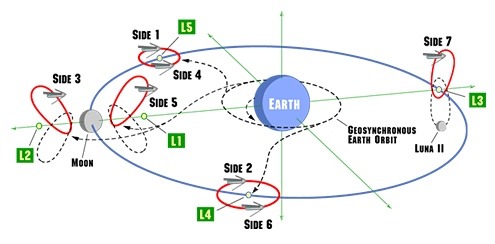
Which means I get to use this rad graphic again.
The Earth Sphere encompasses Earth (obviously) and the 7-8 Space Colony “Sides” in various places in the Earth Sphere. The Sides are essentially clusters of multiple colonies (which are largely self-sufficient). It’s not listed how many were at each side, but we know Side 3 , Munzo aka Zeon, had a lot (at least 40, and that’s just my conservative estimate), whereas Side 7, Noa (later known as Green Oasis) only had one at the outbreak of war. Side 8 was added postwar, and a good deal of the colonies present in each side were shuffled around in the Colony Reclamation Project in UC 0084 (below, also several new colonies were built postwar, both to replenish near-destroyed sides and ease overcrowding).
The Earth sphere typically plays host to various wars of independence (i.e. Zeon), simply because they’re in close enough proximity to the Earth Federation Government for them to realistically claim ownership of the colonies. It’s that sweet spot where they’re close enough that independence is an actual affront to the Earth Federation, but it’s also economically attractive for the secessionists (since there’s actual other entities about).
The above graphic depicts the sides in roughly the arrangement they were at the outbreak of the One Year War in UC 0079 (though obviously their position relative to the Earth would change). The precise organisation changed later, and we have another, absolutely gorgeous in-universe graphic from UC 99 indicates how things were changed:

Side 7 (Noa), 1 (Zahn) and 2 (Hatte) have stayed roughly the same. Whereas the remaining sides have all moved, with the exception of Side 4, Moore, which was devastated in the One Year War. Moore does still exist by the time of UC 0099 (it should be around the L1, or Lagrange Point 1 on the map), but it would be reconstructed into the Frontier Side by/around UC 120. Its omission is likely due to there just not being much there at the time. - Industrial 7, home of Unicorn Protagonist Banagher Links, was located at Side 4 however it’s status as an independent colony under the control of Anaheim Electronics, and it’s under construction status in UC 0096 seems to suggest that reconstruction efforts in the Side are underway, and thus there isn’t much business there. It’s also possible that AirUNA just doesn’t stop there, with Anaheim directly managing the shuttles to and fro.
(Looking at all this though, I do wonder if the “air fare” was cheaper to certain colonies depending on the time of year, since it’d take less time and fuel to get there).
I should mention that the Colony Reclamation Project in UC 0084 is only the largest restructuring we know of. It’s quite likely that there were several smaller changes over time, and we know that several colonies were relocated from Side 2 (Hatte) to Side 5 (Loum) either during or just prior to the Zanscare War in UC 0149. There are also Two independent colonies that exist outside of the Sides - Moon Moon (as seen in ZZ) and Magallanica, a colony builder structure owned by the Vist Foundation (though it would be moved to Side 3 Munzo/The Republic of Zeon) by UC 0097).

It’s also worth noting that the reason for the mass dominance of megacorporations like Anaheim Electronics, Luio&co and the Colony Public Corporation is due to the fact that they build the Space Colonies. The Earth Federation is dependent on them to construct the various sides and prevent an overpopulation crisis since they’re the only ones that can leverage the skills and material to do so. While the space colonisation plan was certainly spearheaded by the Earth Federation government (and seems to have gone impressively well, all things considered), it seems that at least a good chunk of colony construction was privatised, as evidenced with the massive power these corporations wield and how not all sides were created equal (IE, Side 3).
Lastly, I should mention that in UC 0169, the overall structure of the Earth Sphere is completely upended due to the Earth Federation weakening enough that it’s completely unable to impose any sort of order on the Earth Sphere, leading to the “Warring States of Space Period”, which I know very little about.
Jupiter Sphere

The Jupiter Sphere is typically depicted as the immediate area around Jupiter, with it stopping at the asteroid belt. Jupiter is best known for for the Jupiter Energy Fleet. See, in Universal Century, (mostly) safe and effective power is available through thermonuclear reactors, such as the Minovsky Reactor. The catch? These reactors run on a rare isotope of Helium-3, which has to be “mined” from Jupiter, and transported back to the Earth Sphere in massive helium-3 supertankers, like the Jupitris (below).

Because of this, the Jupiter Energy Fleet wields considerable political power, and attacking their ships in wartime is considered forbidden by treaty (Zeon remnant groups break this treaty postwar). The consequences of attacking Helium-3 supertankers are depicted in Gundam Narrative (though technically that’s an extreme case). They essentially provide the fuel that the rest of the setting runs on. It’s also noted that the Jupiter Fleet has a higher-than-average number of “psychic’s” among their ranks (it’s unclear how much the Jupiter Sphere buys into the Newtype theory, so they’re often just called psychics, despite being especially strong newtypes for all intents and purposes). Indeed, both Challia Bull and Paptimus Scirocco are Jupiter Sphere natives.
The Jupiter Sphere eventually gives birth to the Jupiter Empire in U.C. 0120, lead by Crux Dogatie, who really hates the Earth Federation for basically leaving the Jupiter Colonies to fend for themselves, then trying to win him over with a political marriage. The Jupiter Empire Functions as the Big Villains of the Manga, Gundam Crossbone, but they are also backing Cosmo Babylonia, the Big Villains of Gundam F91.

Slight sidebar on Mobile Suit Crossbone Gundam: read it. It’s really good. You don’t have to read every sequel series or anything, just read the original all the way through. It’s essentially a Gundam series as a manga, but the mobile suits didn’t have to have really toyetic designs, so they can be a bit weirder with it. They have a bunch of really good designs, like the Pez Batalla, Zondo Gei and the Divinidad. It’s really, really good.

The Jupiter Empire is opposed by the Crossbone Vanguard Space Pirates, remnants of the old Cosmo Babylonia forces united under Berah Ronah (as well as elements from the Earth Federation and some independent forces) operating from their mothership, the Mother Vanguard. They operate under the banner of space pirates, both as camouflage amongst other space pirate groups and in order to allow assets to be funnelled to them with some sense of deniability “Oh, those dastardly space pirates, they stole four three of our newest prototypes!”. Also they just look really cool.
The Jupiter Sphere really doesn’t have much of an economy compared to the Earth Sphere, which eventually causes enough resentment to lead to war (and the Jupiter Empire’s impending bankruptcy). It’s also notable that the Jupiter Energy Fleet took in several remnants from both Zeon and the AEUG post OYW and Neo Zeon War, respectively. The Jupiter Empire as an entity is technically still a thing up until the most recent date in UC (0169), so other than the Jupiter Sphere being the little-mentioned backbone of UC and its eventual resentment leading to the Jupiter Empire (and in turn the Crossbone Vanguard), there’s not much more to say.
Mars Sphere
Okay, I both only know the absolute basics on the Mars Sphere, and have an incredible personal bias against it, so this is going to be a lot more opinion than fact.
The Mars sphere really only shows up twice in Universal Century however, both times quite different. First, in Mobile Suit Gundam F90 (which takes place around UC 0111) the prologue to F91, in which Mars Zeon, Zeon remnants that fled to Mars, are the big villain. Second, in Advance of Zeta Re-Boot: Black Rabbit had a Dream, which takes place around UC 0091.
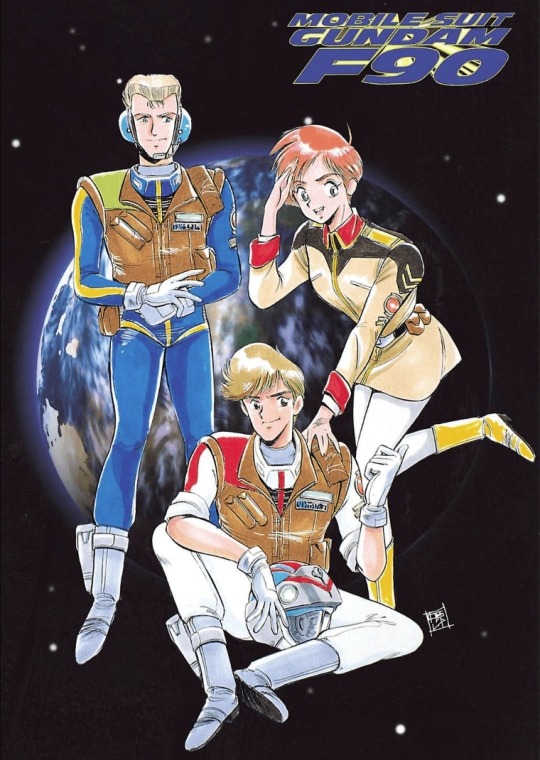
Slight sidebar again; F90’s pretty good. It’s not amazing or anything, but it’s a fairly solid self-contained story that reads like one of the Side Manga to an AU. The fight scenes are pretty good as well, if memory serves. The only real issue is that it kinda doesn’t make the most of Mars as a setting, reducing it to “just” a Zeon remnant holdout.
Which kinda just leads to my main criticism of the Mars Sphere in Gundam - it’s essentially just another Zeon Remnants base. Both series do interesting things with it, but it’s just not that different from the usual Zeon Remnant modus operandi.

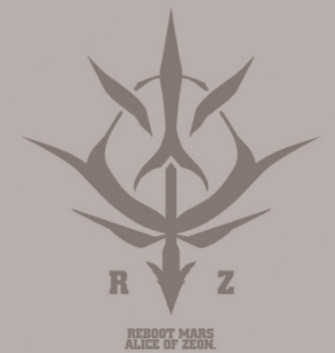
The Mars Sphere was colonised early in the universal century, with the various settlements eventually uniting into Side A (Arcadia). A spaceport was constructed on Phobos, Mars’ moon, and became the primary point of entry into Mars. Mars is essentially remnant groups a-go-go. There was the usual wave of Zeon Remnants in the wake of the One Year War, who would form Zeon Mars. More Zeon remnant groups migrated to Mars after Operation Stardust in U.C. 0083, and formed the organisation ReZeon, who proceeded to wage a civil war on Mars against Mars Zeon in U.C. 0088. Zeon Mars was specifically made up of Gihren Faction Remnants, whereas ReZeon was comprised of Kycilia Faction Remnants, hence the two groups animosity. Mars also played host to Titans remnants after the conclusion of the Gryps Conflict. Members of Zeon Mars (The Chester Fleet) were dispatched to aid Neo Zeon during the Neo Zeon War, with ReZeon taking advantage of the enemy force’s absence.
I don’t actually know how the civil war shaped out, but by UC 0120, Zeon Mars (which could’ve been original Zeon Mars, Supplanted by ReZeon or something else) constructed the Olympus Mons Cannon (sometimes called the Olympus Cannon) which Zeon Mars planned to use to commence long range bombardment of the Earth. They also stole the prototype Gundam F90 unit 2, and planned to use it as the flagship mobile suit of their fleet. The Earth Federation dispatched the 13th Autonomous mobile fleet and F90 unit 1 to Mars in response in order to recover the stolen unit and destroy the Olympus Mons Cannon. This iteration of Zeon Mars was also known as “The Oldsmobile Army”, due to their mobile suits appearing similar to Zeon mobile suits from the One Year War (though internally they were actually derived from the notably excellent Geara Doga).
Notably, elements of Mars Zeon were the absolute last group of Zeon Remnants to be active, acting as a diversionary force for the Crossbone Vanguard in U.C. 0122, drawing Earth Federation forces away from the Frontier side by once again attempting to bombard Earth using a mass driver on the moon, before being wiped out by the Earth Federation forces. Led by Charles Rochester, they were cut down to the last, with the dream of Zeon dying with them. Mars basically settles down afterwards.
And that’s basically all the “Spheres” in Universal Century. I miiight do a follow up about the various Zeon remnant groups later.
Gundam's Universal Century be like
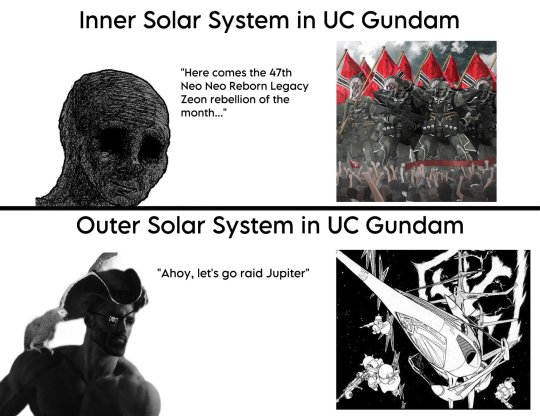
#I know these aren’t really equal but we know a lot more about some spheres relative to the others#gundam#ramblings#long post#gundam universal century#universal century#Gundam Crossbone#Gundam F90#Earth Sphere#Jupiter Sphere#Mars Sphere#Anaheim Electronics#Jupiter Energy Fleet#Gundam F91#Cosmo Babylonia#Crossbone Vanguard#Zeon#Mars Zeon#ReZeon#I really don’t recommend looking into black rabbit had a dream by the way#There’s a reason you only see people talk about the mechanical design
157 notes
·
View notes
Text
HELLO SOME OF YOU GUYS LIKED MISFITS AND SOME OF YOU GUYS LIKED GRADE 11 (i posted about that musical draft thingy back in march and um yea there have been a lot of changes fjxjf) AND GUESS WHAT DUDES I HAVE MORE MUSICAL CONCEPT SHITS TO RAMBLE ABOUT BECAUSE MY BRAIN IS WAY TOO HYPERACTIVE FOR MY OWN GOOD SO SIT BACK, RELAX AND ENJOY THIS CLUSTERFUCK
@ari-is-anxious have fun with this and i wish you the best of luck in trying to comprehend this-
+ Kasaysayan (which means History) - this is the 2nd musical concept thingy i made (the first one being Misfits) and yea i started thinking of this went I was 14. I kinda wanted it to tell a story of like the entirety of philippine history as narrated by students and i wanted to kinda emphasize how history has many faces and how many different factors essentially blur our perspective of what we view as the past. I also wanted to like draw parallels between what our ancestors have experienced and what we currently experience esp when it comes to sociopolitical and economic stuffs and I wanted to like correct a lot of misconceptions about ph history and provide more insight and info about ph's past (i.e how centuries of colonialism have affected our current culture and overall social mindset esp in regards to our want for validation from foreigners aka the whole #PinoyPride thing; how even though activism and revolution is like the main reason on as to why the Philippines even exists, it continues to be demonized here; the ideologies of some of our revolutionary heroes and presidents and why some of them are dicks; etc etc). Also I wanted to showcase like um PH music, art, and dance and how that has progressed and also regressed throughout the years (*shakes fist at colonizers*) and um YEA YOU CAN SEE WHY I EVENTUALLY AND RATHER QUICKLY DISCONTINUED THIS TJCJSJF THIS IS *NOT* DOABLE AT ALL THSJFHF it could work as a concept album and a one-time performance BUT NOT LIKE A LEGIT PRODUCTION SO YEA FOR NOW IT WILL STAY IN THE DRAFT FOLDER FJXNSJF but yea this idea then led to the next two ideas woo
+ Noli/Fili - started wanting to make this at the start of quarantine so like um march 2020 heck i even made a wholeass word doc for this fjdjdv so it's basically a ph-rock-rap-based musical adaptation of Jose Rizal's Noli Me Tangere (Touch Me Not) and El Filibusterismo (The Filibuster) (yes these two novels are like tne national novels here since rizal is our national here and yea these were originally written in Spanish) but the protagonist of El Fili (Simoun) takes charge of telling Noli's story in Act 1 while Noli's protag (Crisostomo Ibarra) takes charge of telling Fili's story in Act 2. Those two books have very different tones and those two characters have um VERY DIFFERENT world views so i thought it would be interesting to tell one's story through the eyes of someone different and yet also the same to provide a lot more insight on how the events in the novels affected these two protags (there is a Good Reason for this and um Filipinos who studied this in 9th and 10th grade know what i'm talking about fhshf if u wanna um know what i'm talking about and don't wanna read the novels (they are very long) i suggest looking up El Filibusterismo and um yea check out Simoun fjsjf). Like for example, there would be times that Noli's narrator (Simoun) (whose general demeanor is like um a lot more cunning and cynical and a lot more resentful of the events that have happened compared to Fili's narrator) would directly question the Noli protag's (Ibarra) actions while Fili's narrator (Ibarra) (he is a lot more um hopeful and peaceful compared to Simoun) often questions how Fili's protag (Simoun) turned into well um a very cynical and cunning person with a taste for revenge (I am trying my hardest to NOT spoil the novels here gjdjf) and yea because the story is set in Spanish Colonial times here, i wanna focus more on the sociopolitical aspects and problems in the novels and how those still remain relevant here, hence the ph-rock-rap-based music. Also I would like to point out that the curriculum here barely like goes into depth about the subject matter of the novels (esp the sociopolitcal parts) and how said subject matter shaped the characters here and HOW EVERY SINGLE THING IN THIS DAMN NOVEL IS STILL RELEVANT,,,so um basically the curriculum is currently missing the entire point of the novels since Rizal wrote these two with the intent to provide socioecononic and political commentary on the pure shit that many of the Filipinos experienced under Spanish colonial rule,,,SO THIS THINGY IS BASICALLY MY MIDDLE FINGER TO THE CURRICULUM AND ESSENTIALLY MY ATTEMPT TO SHOW MORE OF THE NOVELS COMPARED TO WHAT HAS BEEN TAUGHT TO US FJJSJFV this is gonna be a nightmare to write tho cause wow those novels are jampacked
+ Patron - if this ever becomes a thing, I will consider it the greatest thing i'll ever write gjcjdbc I REALLY WANT THIS TO BE A THINGY AAAA so the plot is barebones atm but it's basically about journalism and activism here in the Philippines (and how both can get you killed fjjsjf i'm not kidding these two can legit get you killed wah redtagging sucks shit and the anti terror law can suck even more shit) and how the youth are expected to be purveyors of the country's advancement and improvement despite the fact that our voices are oftentimes dismissed and even permanently silenced when what we say goes against what those in power want us to say,,,those this is basically Misfit's spiritual successor fjxjdjf both of those musicals share similar themes fjxns so yea expect me ranting about a lot of political stuff here and a lot of talking about the ideologies of past and present politics and revolutions and how those affect the masses and how the masses can shape them in return. There will also be talk on how journalism's role in shaping society and how proper dissemination of information and lack thereof can affect people's mindsets aND HOW JOURNALISM IS OFTENTIMES MANIPULATED TO MANIPULATE PEOPLE'S MINDSETS (STUDENT JOURNALIST AND ASPIRING PROFESSIONAL JOURNALIST'S RANTS GO BRRRRR YEA I HAVE A LOT TO RANT ABOUT).
Oh and also this musical is heavily inspired by both the noli and el fili novels and by spring awakening (Everything I Write Will Be Inspired By Spring Awakening dbjxd) in a sense that Act 1's active protagonist (who then becomes Act 2's passive protag) is named Elias and is based on both Elias from Rizal's novels and on Melchior Gabor (which is funny cause rizal's elias is NOTHING LIKE MELCHIOR GABOR SO UM LOOK IT'S GONNA BE HARD TO EXPLAIN JUST UM YEA IT'S MESSY) while the passive protagonist (who becomes the active protag by the end of act 1 and throughout the entire 2nd act) is named Cris Ibarra and is based on Moritz Stiefel and Rizal's Ibarra (more specifically um Rizal's Ibarra's growth into a very different character throughout the events of the two novels).
ALSOOO there is this one concept that made me really REAALLY want to make Patron an actual thingy and that is the existence of um Shadows in the show. Inspired by the voices in Deaf West Speing Awakening, these Shadows can always be found lurking on stage alongside their respective characters like um if Elias is in a scene, his shadow can also be found on stage somewhere. I kinda want them to like represent the characters' innermost thoughts and the other parts of themselves the characters' would like to hide through how the Shadows act on stage and um yea choreography gjsjf Patron is porbably gonna be very dance heavy so um yea it's a bit hard to explain so i'll just point to Alex Boniello and Daniel Durant's Moritz fjxjjf i kinda want it to be like that. The Shadows would be part of the show's ensemble and um yea lots of dancing and prop moving woo also at times they would be singing for the character they are assigned to like um while Elias would be in the middle of doing something on stage, his Shadow would be the one singing in his stead and when his Shadow sings, that's when the character becomes the most vulnerable to the audience because the Shadows often expose their characters' thoughts and worries to the audience that the characters themselves wouldn't really express. So like um the Shadows address the audience a lot gjxjsjd except for one aka Ibarra's Shadow. Instead of addressing the audience, Ibarra's shadow addresses IBARRA directly, often questioning Ibarra's actions (especially their hesitance in Act 1). ig ibarra's shadow is rather representative of what Ibarra would turn into in Act 2 when they take over as the Active protag. But um Ibarra's shadow still questions Ibarra frequently esp in regards to their risky actions so um yea Ibarra's shadow is kinda like the Fates the hadestown wherein they serve to sow doubt but over here Ibarra's shadow is meant to symbolize how insecure they feel in regards to their decisions which well, as the protag, make and break the show. Also um yea the rest of the characters' shadows also start addressing their characters more while the characters themselves start addressing the audience more so woo switcheroo! Also the dynamic that the characters have with each other is similar to the dynamics between the kids in Spring Awakening wherein they are just kids (well in this cause young adults aged 18-20) trying to figure out life in general and all that so woo
(also I would like to note that I really want Ibarra's role to be open to all genders in order to like make a statement that anyone can grow into the character Ibarra becomes throughout Patron but rn hmm i'm still thinking about how that will play out especially given that I kinda wanted Patron's Ibarra to have two love interests here aka Elias and Clara (kiiiiinda based on Maria Clara aka Ibarra's actual love interest from Rizal's novels but um YEA THERE ARE A LOT OF DEVIATIONS GJXSF) but tbh i'm still figuring out a way to make Clara have a much larger role here in terms of pushing the plot cause rn the Elias and Ibarra dynamic have an advantage since um active-passive protagonist switcheroo so I'm kinda thinking of a way to make Clara a secret 3rd protag that is both an active and a passive one? I dunno fjsjd honestly i'm still trying to figure out what Maria Clara represents in the novels cause I know for certain that Rizal did not write her to be a mere demure love interest so um yea WORK IN PROGRESS AND UM ALL IN ALL IBARRA CAN BE PLAYED BY ANY AND ALL GENDERS AND IBARRA IS PANSEXUAL BECAUSE I FUCKING WANT THEM TO BE GJSJJF)
+ Grade 12 - OKI SO LIKE I'VE POSTED ABOUT THIS BEFORE BACK IN MARCH BUT UM I'VE CHANGED SOME STUFF GJXJJD so anyways Grade 12 is well um designed to be a campy-please-don't-take-this-seriously-this-is-just-for-laughs-and-gags musical about 12th graders (i changed the grade to raise the stakes) that makes fun of Filipino TV tropes esp when related to teenagers while also providing a lit more insight on ad to what teenagers go through on a daily basis in terms of trying to grow into the person they want themselves to be while also trying to change to adapt to a world that more often that not goes against them. So yea it's not as heavy as the other musicals, heck I designed this after Preston Max Allen's Carrie 2 musical (dude check it out it has jenny rose baker and it's gold) so woo funsies but i also like this to mean something. Oh and also this is basically me ranting about Everything Wrong In The Philippine Education System (how it more often than not is really detrimental to the students' personal wellbeings through constant overwork and disregard of physical, mental and emotional health issues, its accessibility issues esp the issues experiences by those of the poorer sectors, the um very outdated info at times, how the system perpetuates classism and a shit ton of very detrimental social hierarchy bullshits esp through the implementation of the star sections (speaking as someone who's been in the "lower" sections and has also been in the star sections, I HAVE A LOT TO RANT ABOUT THIS ONE OH BOY FUN FACT I WANTED TO MAKE AN ACADEMIC PAPER ON THIS BUT MY 10TH GRADE TEACHER WOULDN'T LET ME) etc etc) plot is mainly barebones atm but um yea here are some of the updates to the characters: Kyla (formerly named Kate), Noel and Ella haven't changed that much but um I've decided to give the Halos Lagi Nalang number to Kyla and Max (nonbinary student that serves as a foil to Kyla in which Max is constantly being denied opportunities that they want while Kyla constantly refuses opportunities that Max wants; also yea i'll be talking about stories that trans and nonbinary students have experienced in both of my high schools through Max cause i really wanna bring attention to how the trans and nonbinary community is really being shat on despite the um sliiight improvement in the way schools treat the (cisgender) members of the lgbtq+ community; also they are just as ambitious as Ella (i envision her to be like um Draft Eva + Riley jfhdf) um yea major plot pusher woo I'd compare them to Draft Eva + Reese but um I Sincerely And Solemnly Promise To Not Screw Them Over In Act 2 fjjxfj) instead because they will be the ones with queerness being a much bigger factor to their individual plotlines compared to Noel and Ella.
The other main characters are um Marco (typical jock dude who's actually one of the more philosophical and introspective characters in the show; i want to like um highlight the whole sports scholarships debacle, how stereotypes can affect how people are treated in real life and also touch on the machismo culture that's um really being enforced here esp with him being an athlete and all; also he's really good friends with Max and through that friendship he learns that him slightly questioning his sexuality is a good thing so yea), Ruben & Lexi (i don't have that much planned for them atm because woo barebones plot but i do imagine them to be initially framed as the more antagonistic characters and have that like stereotype be taken apart as the show goes on esp considering that both are in the "lower sections" and are um more prone to stereotyping) aND A NARRATOR CHARACTER HMMM WHERE HAVE WE SEEN THIS BEFORE GJXJD oki but this Narrator (can be played by any gender as long as the actor IS VERY FUNNY LIKE COMEDIC TIMING IS A *MUST*) is based on the Narrator in PMA's Carrie 2 but I also want the narrator to be like um more crucial to the plot as the story progresses esp as they interact with both the audience and the characters a lot more so like um it's a bit hard to describe their exact role here because um BAREBONES PLOT FJXJD but altho they can't directly affect the story they are telling (cause so far my plan for them is like um they were a former classmate of 7/8 of the characters here but unfortunately they died due to a car accident), they can and do indeed influence the characters in it and all of the characters (except Kyla) know who they are (especially Ruben) so um yea. Also the solo I have planned for them is called Live On (which is um yea a spin off of Move On fjxjd) and through them, I plan to explore the tragedy of unexpected deaths and what happens to those left behind (this will be based on observations and accounts from many of my former schoolmates) and how many have yet to move on and how they choose to live on despite of that because they know that's what their former classmate, schoolmate, and loved on would've wanted.
SO OBVIOUSLY I OWE GRADE 12 TO SIR PRESTON MAX ALLEN GJXJFJD THANK YOU PMA FOR ONCE AGAIN INFLUENCING MY WORK WOO
+ Concepts - oki so this is the only musical so far that i wanna write solely in English nfjsj so this is inspired by Fun Home in which there are like versions of characters in different ages right? Over here there are 2 versions of 6 characters: the 17-18 year old ones, and the 27-28 year old ones. Through them, this musical will explore two main things: (1) the sad and depressing reality of having to give up one's artistic dreams and passions for the sake of practicality and (2) choosing to take a leap of faith and try to grasp on to whatever chances one may have left to live a life that means more than just making ends meet. Act 1 has the teenagers focus on Point 2 while the adults focus on Point 1; Act 2 has the teenagers focus on Point 1 while the adults end up focusing on Act 2. Once again, um barebones plot with even more barebones characters (heck i dont even have NAMES for them gnxnd) but i think it'll be pretty cool to elaborate upon the shitty circumstances here in the ph when it comes to artistic pursuits and how most of the kids I know are terrified of growing up because they don't want to give up dreaming even though that they know that they have to wake up. I also think it'll be cool to point out thay even though that yea situations like these suck, it'll never ever be too late to pick up the pieces and try again cause at the end of the day, life only ends when you say it will end: there will always be chances, you just need to be gutsy enough to grasp them. Also um yea I originally planned to post like a shit ton of poems this month that would basically be the lyrics of the songs that would go into this musical bUT I'M LAZY SO I'M THROWING AWAY THE POSTING SCHEDULE FJXJSJD anyways here r 2 of the poems/songs that i wanna make for this:
+ In 10 Years - a duet between one of the teenagers and their adult counterpart which is um basically the teen singing their optimistic yet really in-depth and mature perspective on chasing Point 2 while the adult sings about Point 1, wishing that they could tell their teen self about how disappointed they will be; i imagine this to be um kinda like the first version of Dear Theodosia but um more intense maybe fjdjf
+ Run - a duet between two teens who are best friends where one girl tries to convince the other to run and play with her in the nearby playground AND YES THIS DUET IS VERY FUCKING GAY JDJSJDF this was um originally part of Grade 12 tbh and it was supposed to be sung by Lexi and it was supposed to be about a 9th grade event that i personally was a part of where um 9th grade student researchers at a research seminar at a different freaking university took over the elementary students' playground when the seminar finished (I SHALL TREASURE THAT MEMORY FOREVER) and um yea it was basically about holding on to your childhood while you still can...aND THEN I UNINTENTIONALLY MADE IT GAY JFJSJSF Lexi is still getting that song about the research seminar event tho but um it won't be Run cause Run basically turned into a song that's not only about holding on to what's left of your childhood but also to the people you treasure that you know you have to leave behind sooner or later and um yea the girl that the one girl tries to convince to go to the playground agrees to that and then boom go duet stylized after 21 and Alone Now + I Don't Care by freaking preston max allen once again woo (i promise that this won't be plagiarism gndnd) (also altho the two girls have to go their separate ways by their graduation, they eventually meet again at the end of act 2 so woo hopeful ending for the sapphics
OKI THAT'S ALL FOR TODAY FHXHSHD THIS IS WAY TOO FUCKING LONG OF A RAMBLE GOOD GOD AAAAA SO UM IF ANYONE ELSE MADE IT TO THE END, I ONCE AGAIN WILL SEND YOU A SHIT TON OF CARBONARA-
#ari i'm so sorry but this is like...so unbelievably long and convoluted tjxjs GOODLUCK#AND I HOPE YOU ENJOY THIS TJXJSF#so moral of the story is: my brain is too hyperactive for my own good#God help me#also God help those who are gonna try to read this fjxjs#so woo more musical concept rambles aaa#move on tw#move on#ask to tag#izzy's rambles and shit
9 notes
·
View notes
Text
WOMEN IN THE COMMUNIST PARTY OF MALAYA
The history of the Communist Party of Malaya (CPM), also known as the Malayan communist Party (MCP), a predominantly Chinese revolutionary political party formed in 1930 that provided the backbone of the anti-colonial (both anti-Japanese and British) as well as the anti-capitalist movement in Malaya, has been systematically obscured and silenced due to the anti-communist campaigns of the Malaysian and Singaporean governments. In the exclusion of CPM, we see how history is indeed written by the victors. While some prominent male members of the CPM such as its long-time leader, Chin Peng, have written memoirs to tell their side of the story, the history of women’s involvement in the CPM has especially been forgotten and ignored despite their contributions to the party’s strength. This is because many of the women, due to circumstances of their time, were not very well educated and cannot read or write, much less write their own histories (Khoo, 2004). Women members of the CPM had remarkably similar motivations as those of recruits who joined the all-female Rani of Jhansi Regiment during WW2. Many of these women in the CPM saw the movement as a form of rebellion against the feudal and oppressive patriarchal structure that they experienced in their own lives. Born into periods of socio-economic transition and political turmoil, they witnessed injustices and the exploitation of their communities by the British and Japanese colonial governments. This compelled them to join the CPM, the only force fighting against colonialism at the time. The Maoist ideology promulgated by the CPM also appealed to its majority ethnic Chinese members (although there were also Malay, Chinese and Thai members) that felt a sense of patriotism towards communist China. To shed light on the social memory of women in the CPM, Agnes Khoo has written a ground-breaking book consisting of a set of oral history interviews with sixteen women from Singapore, Thailand and Malaysia who were involved in the Malayan anti-colonial struggle and led extraordinary lives. Many of them now live in political exile, in villages close to the Malaysian border in Southern Thailand, where many of the CPM guerrillas remain stateless to this day. Their interviews highlight women’s participation not just in the CPM, but in the wider social and political landscape of Singapore and Malaya. This blog entry will highlight one voice- Guo Ren Luan who was born in 1937 in Singapore. Her full interview can be found in Khoo’s book.
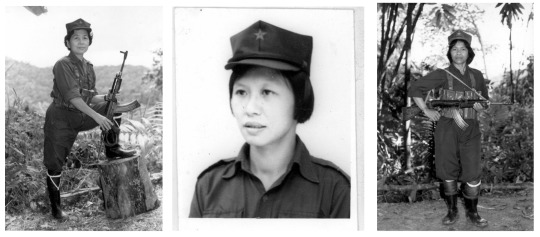
Women members of the CPM. From right to left: Chen Xiu Zhu (Born 1937, Bukit Gurun, Kedah), Cui Hong (Born 1949, Thailand), Suria (alias Atom. Born 1951, Thailand). Source: Agnes Khoo.
Guo was influenced by one of her classmates at the Nan Chiao Girls' High School, but she joined the CPM on her own accord after the 1953 rape and murder of a girl by a man who was heavily influenced by pornography. This incident sparked the beginning of the 'anti-yellow culture' campaign in Chinese middle schools in which Guo actively participated. Guo says that “I joined out of my own sense of justice and initiative. As women, we felt more for the issue because we realized this could happen to us anytime. So it was natural that we did not agree with what was going on” (p. 5170-5171). The anti-yellow campaign is believed to have been originally organized by the leftist in Chinese schools to urge students to read and take interest in pro-communist materials as against non-communist content or matters which were branded as Yellow, such as aspects of Western popular culture like pornography. Guo also became very active during the anti-military service movement, which was a movement opposed to the implementation of the National Service Ordinance by the British government, a policy for the mandatory registration for military service for boys at the age of 18. According to Guo, her fellow students and her “saw it as a British plot to attack the CPM. We knew the CPM was good for the people, so we disagreed with the [British] government for using the army to repress the CPM…We did not understand the issues [of communism/the CPM] very deeply ourselves. We were against colonial oppression; that was it” (p. 5198-5199). The anti-military service movement culminated in the National Service riots of 1954, May 13th- “We were angry that such a peaceful and legitimate action of the students was brutally suppressed by the government, so we felt that we had to support them. As soon as I got there, I was shocked - the riot police with batons and anti-riot buses were everywhere. Sirens were sounding and the police were about to hit…That was the first time the anti-riot squad was used against the students. I saw it with my own eyes. It was easy to frighten the female students. As soon as the batons hit them, they all started crying and running away. I was not hit though. I just ran all the way home…The police reaction towards the students made me finally realise that actually they are not meant to protect the people” (p. 5218-5219). As a student, Guo continued to participate in various movements and rallies as part of the Federation of (Chinese) High School Student Unions, including at workers strikes like the Hock Lee Bus Strike- she sang and danced at the workers’ rallies and partook in fundraising for them. Guo says that “as my family was poor, my heart has always been with the workers and peasants, who shared my conditions” (p. 5255).
Eventually, Guo was targeted for her political activities as part of the CPM and the Students Federation which was banned by the British government. She fled in 1957 but remained underground in Singapore. After she went underground, she lived in a farmer’s house in the rural countryside area of Singapore. “We would consciously teach the housewives. Through these literacy classes, we spread our ideas and visions to them. They were basically sympathetic to us since we were seen as students oppressed by the government and hiding in their homes…We also wanted to train ourselves in hard labour so we removed our shoes and slippers and joined them in farming…In other words, we tried to integrate with them. We did whatever they were doing. Women’s work was both in and outside the house. In the morning, the women had to wash clothes; fold them up when these were dry, prepare meals, take care of the children and so on, whilst the men could relax after work, have nice chats and drink tea. The men hardly did housework. Literacy was our focus during lessons with the women in the village. It was not so much politics or gender consciousness. Nevertheless, we tried to share our opinions about gender equality informally when we were doing farm work or housework together with them” (p. 5348-5360). While she was underground, she also met her husband but soon after her wedding, the mass arrests of February 2, 1963, also known as Operation Coldstore, happened and her husband was later arrested. “I left Singapore only after Lee Kuan Yew had taken over the government and the February 2nd incident took place in 1963. Thinking back, we had mobilised the masses to vote for the People’s Action Party during the General Election. We were supportive of Lee Kuan Yew then. Lee Kuan Yew came into power and he began to change. He started to arrest our people. By that time, we felt the winds of change already and were somehow prepared.” Since then, Guo has remained in exile from Singapore. With other CPM members, she lived like a nomad in Indonesia for 15 years, having to take care of her daughter alone- “In such harsh circumstances, it was very difficult, especially for female comrades to endure and persevere. As women, we not only had to protect ourselves, so that the enemy would not capture us, we were equally responsible for the safety of the group, as our male comrades” (p. 5580). It was only until the 1989 Peace Agreement which marked the end of the communist insurgency of Malaysia that she relocated to Yala village in Southern Thailand, calling it her home.
“Some people told me that I had wasted my youth and precious time in the movement. I do not put myself on the high pedestal but I really do not find my decision a pity. I have had some very rich and extraordinary experiences. I have no regrets. My life has been enriched. I never thought that I could live until today. I had narrowly escaped so many arrests back in Singapore. But I had a concrete goal in life and I was living together with my comrades, it was a full and rich life. This was meaningful work even though it might not be seen by the public as such.” (p. 5714) Like other women interviewed by Khoo, Guo upholds her decision to join the CPM, and believes that the CPM’s anti-colonial fight should be acknowledged in playing a role in the independence of Singapore and Malaysia.
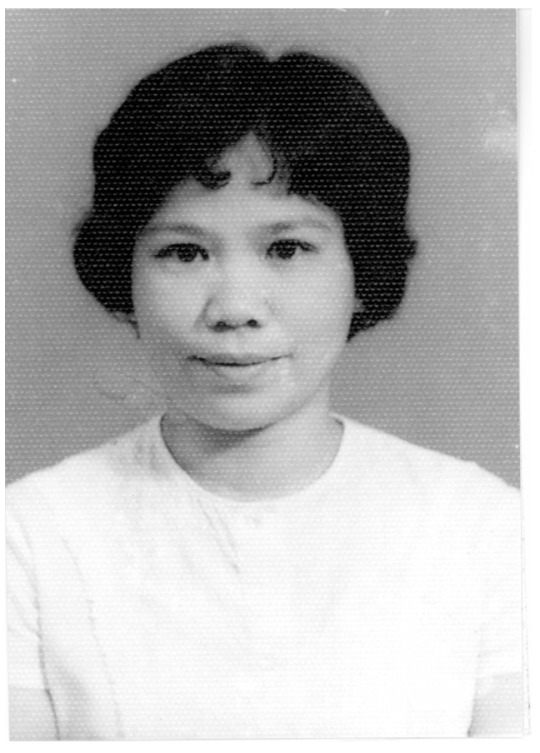
Guo Ren Luan (Born 1937, Singapore). Source: Agnes Khoo.
References
Khoo, A. (2004). Life as the river flows: Women in the Malayan anti-colonial struggle. SIRD.
7 notes
·
View notes
Note
I'm writing a lighthearted story about lady cowboys which will include queer and PoC rep. However, I know the concept of the Western frontier is colonialist because it was originally indigenous land, and I plan on having one or two Native characters (likely Cherokee). How do I address this as a white writer, without speaking over/for Native people and without detracting from the lightheartedness of the story? Would it be better not to address it at all, or would that be irresponsible?
Addressing Native Issues in Cowboy Story
Cherokee is probably the wrong tribe to pull depending on the time period. In the 18th century is when they switched from being a mostly Eastern tribe to a plains one, and the area is filled with a much different mix of tribes. You could be dealing with everything from Plains to Southwest, which is hundreds of potential peoples.
People pull from Cherokee because it’s popular in Hollywood, and because they’re the largest name, and I get a little sick of everyone pulling from Cherokee when there are so many other tribes to pull from. Especially for highly regional pieces in regions they didn’t always live in.
Cowboy history is interesting. It’s an intermingling of Mexican, Black, and Indigenous culture, and the reason it’s cowboys was infantization of the PoC involved.
I noticed you didn’t ask about the cowladies, which I take it to mean you planned on them being white—this is part of the colonialist narrative that is, at its core, at least partially ahistorical; you’re more likely to have Mexican, Indigenous, or Black cowladies than you are to have white. So changing the ethnicity of your leads will help add a different twist, from “colonizer exploiting” to “marginalized person trying to survive.”
I’d say it’d be irresponsible to not address Native issues if this story is meant to be grounded in history. Elaney has a guide on cowboys that you can start with. There are also sources such as this (which is unfortunate in its use of “Indians”, but this is an edu), this piece on African American cowboys, and another piece on Native cowboys for you to just get a basis on what the population was actually like.
Ranching provided some wealth. It provided a lot of land displacement. It provided hunting/raiding targets that helped offset the land displacement and created a lot of wars and feuds. If you want to keep it more lighthearted, I’d love to see the skills Natives had with the profession respected.
But, all of this advice is dependent on what time period within cowboy history you’re pulling from. Is it the 1500s, where it’s basically exclusively Hispanic and fairly contained to Mexico (where Texas now is) and the main conflict is Apache versus Mexican? Or is it in the late end of the period when the government is involved and outlaws and the typical Hollywood cowboy, but more Natives have started ranching for economic purposes/to keep land?
The advice will change wildly depending on where within that 350~ year period you’re dealing with. There are so many different contexts and pieces at play in the wild west that it’s impossible to narrow it down into something more useful.
So nail down a time period, do the appropriate research into the state of colonialism at the time, and come back with something more specific.
~ Mod Lesya
870 notes
·
View notes
Text
Humans Are Historically Known for Being Terrible
Hi I’m here with an opinion today. Let’s see how many words it will take for me to adequately get it across on this very fine 15th of January
I personally believe canceling things from the past* is fruitless, pointless, and accomplishes about as much as censorship does
*We aren’t talking about shit like nazi Germany, let me elaborate further
So, as I occasionally do, I have seen a post on my dash today criticizing something historical that people are ‘problematically partaking in.’ That thing today was the wellerman sea shanty due to its ties with colonialism, slavery, and so forth.
I’m not going to dive into this specific example, because I don’t know enough of the details and am not interested in going to find them out because I’m not planning to defend it or its history, so there’s no point. I learned what I needed to know from said callout post and it’s enough to work with.
To me, it is important that we remember that people, in general, have been historically pretty terrible.
There’s colonialism, there’s slavery (of all kinds, including chattel), there’s thievery, murder, genocide, sexism, the murdering of queers. There’s lying, manipulation, propaganda, and so many more things that I couldn’t possibly list them all. I’m not saying that everyone was equally shitty. I am aware that, especially in the most recent couple hundred years, white people, especially Western Europeans and Americans, have been pretty Shite.
Am I excusing them for their actions? Absolutely not. I think it is always important to bear in mind the way they played a part in cultures’ growth, death, and, ultimately, development from one year to the next.
The reason I’m pointing this out is because the result of people being historically shitty is that most, if not all, of our historical content, our history, is steeped in horse manure.
There is not one thing you can enjoy from centuries - even decades - passed that is not here because of something inhumane, unjust, or otherwise terrible.
The only thing keeping us from canceling every other historical thing that we enjoy is our lack of awareness of how each thing ties into the whole mess.
So, we’ve learned that wellerman was sung by slavers and thieves and colonialists. What about that nice little folk song from uh, idk, Ireland or something? Let’s take this metaphorical song and ask the question, “who wrote it?” The truth is, for many folk songs, we just don’t know. There is a very very good chance that 90+ percent of nice, soft folk songs about lying in the grass or feeding chickens or baking bread for your spouse were written by racists, sexists, abusers, homophobes, and so forth.
Does that make it wrong to enjoy that song about lying in the grass and looking at the stars? I don’t think so. No one is profiting off of you listening to it, regardless of who wrote it. It’s hundreds of years old. Do you even know the name of who wrote it?
Remembering that times were different may not absolve something of its wrongdoing, but it does provide us context.
We have to allow ourselves to admit that most, if not all, historical things, came from or benefitted from atrocities or injustices that we would not stand for today. That’s just how human progression works. Frankly, if people 200 years from now don’t look at US, CURRENTLY, and think we’re terrible assholes, I am actually very concerned by that.
The nature of humanity is to get better and better over time and to build a world and a society where we don’t feel the need to be controlled by greed or to consume unethically. The problem is, it takes time. It takes lots and lots of time. Would it take less time if certain people weren’t terrible, terrible people? Yes it would. But they are, and so it doesn’t.
The fact is, human progression and improvement will never reach its end because, as things improve, our perception of our past actions will change as well and we will begin to realize that what we were doing wasn’t acceptable and is no longer necessary nor excusable.
Hate Jeff Bezos? Look around and see that 90% of people still buy from Amazon, because it provides the only affordable source of many products for people who don’t make enough money under capitalism to buy from a small business.
Hate Bill Gates? How many of us are willing to switch to Linux to quit using Microsoft? Speaking of Microsoft, they own Minecraft. Do we stop playing Minecraft?
Think Steve Jobs is a terrible person? Why are people still buying iphones, ipads, and macs? Why don’t we stop buying those so that he and current CEO, Tim Cook, quit making billions of dollars?
These are just a tiny amount of examples, using big names. We also must consider, if you have 100 books on your bookshelf, how many of the writers of those books are racists, homophobes, sexists, or abusers? I guarantee you it’s a non-zero answer. The thing is, an author who’s relatively nobody is not someone who gets canceled. No one knows anything about them but that they wrote a neat work of fiction and it’s a good book.
The question is, should we be expected to quit buying, consuming, and enjoying things made by problematic people?
In some cases, the answer should be yes. If someone is currently profiting massively from people consuming their media or products and people are ignoring their atrocities, that person could end u making millions or billions of dollars despite being terrible, which is something that undoubtedly affects all of us, economically.
In the other cases, the answer should be, do you want to? If you’re not comfortable with something, you should, of course, stop consuming it. If you can ignore the thing, you might not need to bother. And, that doesn’t necessarily mean you’re excusing it.
If we look at all of humanity, even in the present day, mathematically speaking, 50% of people are more bigoted and terrible than the rest. There’s no other way for it to be. Less than 50% would be a mathematical fallacy. Does that mean we only consume content from the better 50%? Does that mean we rigorously research producers and creators and their personal lives only to decide it’s not worth the risk of ‘contributing’ because they have no trace online except for a private Facebook account? Is them having a Facebook account enough of a ‘sin’ that it’s not worth it to buy their book?
This brings us to the censorship point
If you know your history, you know that censorship is a nasty thing. When one person decides who or what is unethical to consume from, they sometimes seek to get rid of that thing so that no one has a choice - so that no one is Allowed to consume that thing.
This has led to book burning, the destroying of decades and centuries of research about sexuality and gender. It’s destroyed religious texts. It’s destroyed content created by women that painted any single man in a bad light. It’s destroyed progression.
“But I only want to get rid of the bad thing that everyone agrees is bad!”
It doesn’t matter. If you open the door to censorship for yourself, those who wish to use it for worse reasons will become just as justified, in their own eyes, to do the same. You’ll have Christians saying it’s okay to get rid of gay content because it’s objectively wrong according to the bible. You’ll have conservative parents burning books with complicated topics like abuse and assault because they don’t want their children to have access to anything controversial or complex like that.
You cannot open the door to censorship for one group without opening that door for everyone. And that is why we do not censor things.
The question then becomes, but what of the people consuming that media? Even if it’s not censored, consuming it still makes someone bad, right?
Not necessarily. People consume problematic stuff all the time - things considered objectively bad. However, people don’t always consume said media because they support it being normalized in the real world. For example, fanfiction or books with rape in them may be something a victim reads to cope with their own past or present. A book with abuse depicted may actually make a young teen aware that what they’re going through is abuse. Content largely seen as ‘problematic’ can often play a part in solving the problem it portrays.
Then there’s historical, problematic media. Now, this is an area where I feel things have actually been OVER complicated.
Because everything historical has some tie to injustice, there is no ethical way to consume it.
There is no ethical consumption under passed time.
So, how do we judge whether something should or shouldn’t be consumed? It is my opinion that something historical should stop being consumed and become shunned when its meaning is well-known enough and its message is still pervasive enough that it is actively causing problems.
For example, we generally try not to consume content when it is made by someone who is a known nazi. This is because nazis are still a problem in our society, presently. We have antisemitism all over the place. Therefore, we cannot let the message become that it is okay to be a nazi by way of us treating nazis like normal people and allowing them to succeed in society without consequence.
However, there are certain problems that are no longer particularly prevalent or which are agreed to be terrible on a large enough scale that consuming the content does not necessarily imply you believe it is okay. For example, if you look at literally any media from the 1800s or which is placed in the 1800s, you will see a lot of casual sexism and gender roles. Should we despise that time period because sexism was readily available at every turn? Should we refuse to enjoy 19th century fashion or culture because it had problems? I think not. I think it would be pointless to refuse to consume, read about, or otherwise engage with the 19th century. It wouldn’t change the past and it isn’t going to somehow undo the progress we’ve made on women’s rights.
As a matter of fact, if someone merely suggested that perhaps the people of the 19th century were right for forcing women to wear long dresses and darn socks all day, they would be laughed into oblivion and called a shitty, sexist incel (which would be correct).
Does enjoying media from or placed in the 19th century mean you support sexism? I certainly hope not, since I enjoy it very much and know a lot of progressive people, women especially, who do enjoy that kind of thing. It is common sense enough, at this point in time, that people don’t generally believe that the sexism of the 1800s was acceptable. I am not going to see someone watching a period drama and assume they desire for our present-day social laws to be like what’s portrayed. That would be a ridiculous assumption. However, I could not assume the same about someone I saw watching openly antisemitic content. I would quickly wonder if they’re an antisemite/nazi/white supremacist.
So, what about that one thing I heard had a sordid past?
Listen, if we’re being honest here, most things from history have a sordid past. Sea shanties? You bet. But then when we talk of sea shanties being steeped in colonialism, we have to look at the bigger picture. What about pirates? Pirates were, by and large, a huge contributor to slavery, theft, colonialism, and murder. Does that mean enjoying media with pirates is glorifying or contributing to slavery, theft, colonialism, and murder?
(I’m about to talk a lot about pirates but this can be applied to anything that was historically bad but is no longer prevalent)
Pirates of the Caribbean is only a movie, but pirates did once exist and they did kill people. They did raid ships of merchants and tradesmen and they killed them and stole their goods. They took many good men from their families and even killed working children aboard the ships. Does that make enjoying pirates in media a contributor to these things? No. It doesn’t. We are looking at a dramatised, cleaned up version of the original piracy. I think most people are aware that pirates, in the real world, are bad and harmful and should not be supported. That doesn’t make pirate media any less fun in theory, and under our own terms.
Then we arrive at our perception - because most of this does come down to perception. When you watch pirate media, should you enjoy that, are you able to divorce yourself from their actual history enough to enjoy the media? If you can, you might enjoy it a lot. If you can’t watch a movie about pirates without thinking the entire time about how terrible they were and how much damage they did, then pirate media just isn’t right for you. But, it doesn’t mean you should attempt to take it away from others. Your opinion and perception of pirate media is not the global perception.
I have to ask, do you think others view it the same way you do?
When you read that question, you may be wondering what exactly I mean. What I’m asking is, do you believe others view that media with the same “clarity” that you do? Do you believe they understand the atrocity of real pirates and Feel that the entire time they watch the media and still enjoy it anyway?
Perhaps that’s why your response to someone enjoying something you feel guilty partaking in is, “these people all must not care about the real-world damage pirates did. The fact that they can watch this (despite sitting here and feeling the same things I do) makes me sick.”
However, if that is the case, you must remember that for a lot of people, the awareness of real world consequence is suspended during dramatised depictions of it. It doesn’t mean they have forgotten about the real-world consequences of piracy or that they don’t know it at all. It just means they are choosing not to think about it in that light while consuming media.
There is also the assumption that people must not know about something when partaking in it. You may think, “How can they enjoy this media? They wouldn’t be able to stomach it if they realized what really happened with pirates.”
In many instances, you would be correct. A lot of people are ignorant to what pirates have done in the real world. If you told every ignorant person the truth, maybe 5% of them would then become turned off by pirate media, and the other 95% would keep the truth in mind and then divorce themselves from it to continue enjoying said media.
There are realities that it is safe to divorce yourself from, and there are those that are not.
Is allowing yourself to enjoy dramatizations of pirates making you ignorant to present day conditions? Not largely. There are still pirates today, but not nearly enough for the average Joe to need to take them seriously. Those who need to know about them and do something to stop them are aware.
However, it is not safe to divorce yourself from, for instance, the holocaust. Divorcing yourself from the holocaust and seeing it as merely a dramatic setting with dramatic events and not a present-day real-world problem is exactly the kind of thing that leads to young teens being sucked in by white supremacy and naziism as well as what leads to many average conservatives believing the rise in white supremacy isn’t actually real or is not a big deal. They have distanced themselves so far from the real-world atrocity of the holocaust that they have forgotten it was real and that real people, like them, were contributors. They don’t want to believe that everyday people had any power in it and that it was tiny acts of willful ignorance that made concentration camps so successful.
All in all, there is a different answer for everything we consume.
Want to know if something you’re consuming is okay to consume? Ask yourself: is this produced by someone who is contributing to present-day conditions? If the answer is yes, quit consuming it. If the answer is no, ask yourself, does this media make me uncomfortable because I’m aware of its roots? If the answer is yes, stop consuming it. If the answer is no, it’s probably fine. You are most likely not doing any damage, so long as you are aware of what is wrong with the content and are not using it as grounds to perpetuate harm.
If, when thinking about something problematic in an old piece of media, you cringe? You’re on the right track. If you feel inclined to make excuses for it or justify the wrong in it, it’s time to step away and reevaluate why you feel the need to do so. If you’re doing so because you feel guilty for consuming it, you need to realize that it is actually more harmful to make excuses for the wrong in order to justify your consumption than it is to admit, “Yeah, this media is problematic and contains a lot of sexism, but I still enjoy it for its other qualities.” It is better to admit that you enjoy something problematic than to spread the message that what is happening in it is okay.
Some of you may be thinking, “Or, just stop consuming problematic media.”
I think in many cases, especially recent media, where your consumption has an effect on production, this is true. However, for media that is no longer being produced, I will remind you that most things have something wrong with them - yes, even pretty recent stuff.
Supernatural kills off women constantly, queerbaited the fuck out of its viewers, and sent a huge character to fucking mega hell for confessing his love.
Scrubs has no end to its sexism, transphobic and homophobic slur usage, and other problematic content.
V for Vendetta glorifies and shines a heroic light on a character who kidnaps and tortures a woman for what appeared to have been weeks or months so that she would be forced to understand his trauma and “no longer be afraid.”
Star Wars has incest, the producers/directors abused Carrie Fisher and sexualized her as a young teen, and probably a lot more that I’m not aware of because I haven’t seen the movies nor read the books.
I don’t even need to start on shows like Breaking Bad, Game of Thrones, Community, That 70s Show, and so many more. Almost every popular piece of media has something worth canceling in it. There is no point trying to curate your media consumption to only unproblematic content, because it simply can’t be done.
Curate where it makes a difference. Sigh heavily the rest of the time. Make yourself aware what and how things are problematic. Put critical thought into how your consumption is capable of supporting or perpetuating a problem and how it is not. Make informed decisions.
Do not feel guilty if you are unable to flawlessly live up to the standards of purity culture. None of us can - not really.
#long#longpost#long post#racism mention#antisemitism mention#nazi mention#holocaust mention#sexism mention#transphobia mention#homophobia mention#spn#supernatural#pirates of the caribbean#pirates#potc#scrubs#got#game of thrones#breaking bad#community#that 70s show#sorry im a bitch and tag everything i talk about in my posts so people with it blacklisted dont have to see#media#purity culture#cancel culture#wellerman#piracy#sea shanties#problematic#psa
13 notes
·
View notes
Text
GlumReviews #5
Stepping further into the darkness we find our journey landing us on July 18th, 1980. The release of Joy Division’s second and final studio album. Those not familiar with the band history should be aware that this album was released 2 months after singer Ian Curtis’ death.
By this time in music history the world had witnessed the folly of mankind as societies collapsed and transformed due to economic or social woes. This is some of the first popular music that was perhaps the most honest as it could be, it didn’t lie to you, there was no promises of a better tomorrow, your future prospects will be dried up by the time you’re old enough to manifest them.
Curtis’ lyrics pull no punches about the dour and hopeless experiences of the human condition. The music itself is a sparse backdrop to his narration. Definitely not an album you come strolling into looking for a good time. Although I read previous reviews saying it was danceable music so what the %^&* do I know.

1. Atrocity Exhibition
The album opens with a tribal-like drum lead, beginning a relentless journey through the tortured mind of Ian Curtis. Random sounds and textures fade in and out, building to add a layer of menace to the overall tone. The lyrics, stark and crushing. “All the dead wood from the jungles and cities on fire/ Can’t replace or relate can’t release or repair.”
2. Isolation
A synth heavy turn-around from the intro song, something a little more cozy, but in contrast of the upbeat sounding song, Curtis goes on to sing “I’m doing the best that I can/ I’m ashamed of the things I’ve been put through, I’m ashamed of the person I am”. The theme of--yes Isolation is heavily present throughout the album as it feels this entire album was recorded in the vacuum of space. Sterile and cold. Almost empty. As mentioned before Curtis pulls no punches with his lyrical content but the rest of the bands playing feels like an exercise in taming that overwhelming emotion that Ian constantly struggles to keep in.
3. Passover
As a pretty empathetic person it’s difficult to read his lyrics at times because they are just so brutally raw and negative. Most people don’t talk this way for fear of alienating people, but the way he sings it, how it’s sung. You just feel the exhaustion of a world beating down on you. The music is simple, but it serves a perfect device for him to convey his message of “This is the crisis I knew had to come/ Destroying the balance I kept”.
4. Colony
In reading some interviews from Joy Division, when asked to explain the lyrics to his songs, Ian says that it was simply up to anyone’s interpretations what his lyrics meant. And I can really respect that, because for one it makes it easy for me sound like I may actually know what I’m talking about here. But really it allows the listener to make something personal to their own experiences, I’d offer mine up but this album is dreary enough. It really feels as if Ian is just in a completely different band from the rest of his bandmates as some of these compositions don’t really match up with the vocal moods.
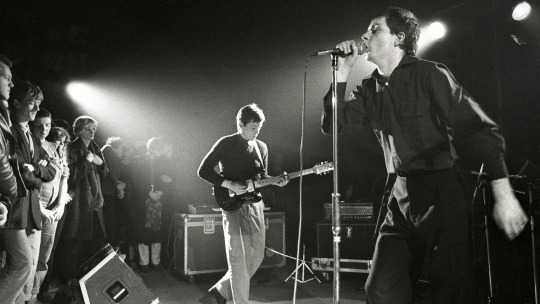
5. Means to an End
Now with the previous song in mind, this is where I feel they all align in ideology or mood. As previous bands I reviewed, Joy Division seem to have a distinct style that made them stand out from a crowd of hundreds of bands in the same position as them. This is that sound and it embodies everything perfectly. Vamping lyrics, a hopeful hopelessness in the sound but it’s all just the soundtrack to the deteriorating condition of someone whose experienced too much loss to really muster up the energy to keep fighting.
6. Heart and Soul
“Existence, well what does it matter?/ I exist on the best terms I can”. And this album is just full of these strikingly dark and beautiful lyrics. The song itself, which was brewed with a punk backbone, but lacking the power of rage, it’s chill mood music and again such simple arrangements carrying Ian’s haunting singing. A steady groove of vamping lyrics and regretful self-loathing.
7. Twenty Four Hours
Another staple sound for goth bands of this era is the chorused bass sound heavily present here and I love it. One of their more energetic songs for Ian to brood over. According to interviews with Joy Division, Curtis’ bandmates wish they would have noticed the signs pointing to his untimely demise sooner. Furthermore also saying they’d never really paid attention to the lyrics. Because I mean.....it doesn’t take a scholar to read between the lines of the massive monoliths Ian Curtis was constructing to doom and gloom. And I got all this from wiki so if you wanna read up more about it I suggest starting there and digging through their sources provided. Invoking a gloomy Jim Morrison, this song is a pretty standard experience with Joy Division by this point in the album but the stylistic changes are welcome to break up any monotony you may be feeling.
8. The Eternal
A very somber song encased in synth pads and dark gothic piano. Painting the picture of a funeral, of going through the motions of death and loss. These are probably some of the saddest, depressing songs I’ve ever heard in a row. Not being said to take away from the album. If you ever wanted to hear what a normal person sounds like, I think Ian Curtis is that voice, just a young man lost in a gigantic world, suffered from epilepsy and battling depression amid a dissolving marriage. Being hoisted on-stage where he would be victim to his seizures. Even in wanting to shout his pain to the world, he was made to suffer.

9. Decades
The album closes with a realization of sound. A beautiful piece of music as they abandon almost all instruments in favor of cold, lifeless synthesizers. and they play with Ian’s voice so beautifully in this moment. Alot of these songs play as if they’re being sung by someone dying on the side of the road. Watching a world pass them by, counting up all the regrets and eventually having to let go.
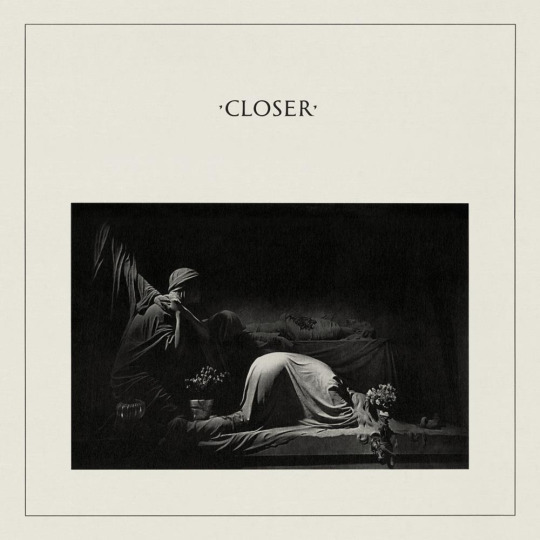
This was not an easy album to review as it took multiple listens to really get it to sink in, perhaps I’m not at the darkest moments of my life, but I empathize deeply with Ian’s thoughts and emotions. Through the research and listening of this album I do feel a bit of sadness for him, and thankful that such a record exists of such a HUMAN take on the world and music. I find it really hard to rate because of how relentlessly depressing it is at times, does that take away or add to the experience? I guess every listener will react differently and perhaps if you’re one of those people who needs sad music to get through difficult times, this could serve as an important piece of music to you.
⭐⭐⭐⭐/5
I decided that the depressingly real aspect of it only adds to the experience. While not exciting in terms of a party or dance record, it really does serve as an important document to mental health and the struggles of depression. I’d be hard pressed to say I’d revisit this album again. But I’m glad to have discovered it and really gave it a chance to grow on me.
7 notes
·
View notes
Note
Hello Salty!! As an aro person obsessed with everything Regency, I have to ask: Is Hugh aromantic? I’m looking forward to playing the other romances, but I’m also definitely creating an MC to go the marriage of convenience path with Hugh and have a lasting friendship with him! I’m sorry if this comes off as insensitive, I don’t mean it to come off that way, I just don’t see aro characters in Regency media and I’m a bit excited aha 😅 Feel free to ignore this for any reason! And have a good day!!
Hi!! Dw, this isn’t insensitive at all!! And I totally feel you on the lack of aro rep in regency media! It was really important for me to try to include characters and ros of different sexualities, instead of going the cliche, everyone is bisexual(which is still totally valid and chill!) or player!sexual. This one is gonna be long! So under the cut! Also cw: lots of sexuality talk and some mentions of colonialism!
I was going to wait until the prologue was out to explain some of the things I changed about the regency setting to make the game more poc and queer-friendly, while preserving the social and economic conventions that make the period so interesting. But I think this is a good time to explain my thought process!( also sorry for the ramble-ness of this and for anything I say that’s wonky) I’m hand-waving most of the British imperialism which is how the aristocracy paid for all that silk, muslin, gold filigree, and high-flung landed life-style. The hand wave is mostly so I can write characters from different parts of the world, especially the places Britain would/had colonized, without resorting to the usual ways they are depicted in regency stories(which are sometimes valid and sometimes not!)....but that should probably get its own post! The other reason is personal. As an Indian woman, it can be difficult for me to write about British imperialism and colonialism so close to my own personal family history(but again! that’s for another post!) I’m also changing some of the attitude of the period towards queer relationships. Of course, LGBTQIA+ people existed and had meaningful lives within the framework of regency society and I’ve reached out to some of my Austen scholar friends for insight on how those identities manifested or didn’t in both literature and the period(so I might tweak this a bit and again, I’m sorry for the ramble!) This will be in the game and hopefully less clumsy, but queer relationships aren’t illegal or even really frowned upon. One is free to pursue or not pursue relationships--romantic, platonic, sexual--as they wish. But the pretense is very important. An unmarried person’s movements and relationship are heavily scrutinized and judged. After marriage, it’s assumed, and sometimes even encouraged to do as you wish, as long as all parties are in agreement. Hence the popularity of marriages of convenience. And while the society operates with these assumptions, you are expected to uphold the pretense of hetero-normativity. TLDR: Marriage is an economic/land/family name convention, but you gotta keep up appearances and the landed Gentry isn’t entirely English.
And for full disclosure, I don’t identify as aromantic, though I used to and my knowledge isn’t perfect. So, I’m open to talking about this further and changing things! And that goes for any of the characters in LaF!
Now with all that set-up, to your actual question! Hugh is definitely on the aro spectrum. Romantic relationships have never been a priority for him, which can make the social aspect of regency a bit irritating as you can imagine. His friendships, his family relationships have always come first. That said, he is in a relationship with another gentleman. You’ll get to meet Hugh’s partner in the latter half of chapter 1 and get to have a nice conversation with both Hugh and his partner about their relationship if you aren’t a dick lmao. Hugh has known his partner since childhood and their relationship isn’t all too romantic. It’s more a best friends with benefits, although I’m not sure how I feel about calling it that.
I tried to do some research into queer identities and specifically aro and ace identities in the regency but I couldn’t find anything conclusive on how people in the period would refer to themselves if they were aro/ace. But in modern terms, Hugh would say the label demiromantic fits him best. But like even then, he is not a fan of romance. His partner is a special case. Now if we’re talking sexual preference, Hugh is gay.
So, Hugh is very down to have a marriage of convenience with a MC who is chill. If we’re being completely honest, Hugh would down for that kind of deal, even if MC doesn’t want to be friends. The marriage would be an end to all the pestering he gets from the tiger moms in society.
I’m so glad you are excited for his route! I was very scared people wouldn’t respond well to my son because of the platonic nature of his route but like you said, there just aren’t many kinds of relationships like this in regency media. And it’s a damn shame considering how well it fits the aesthetic and conventions of the time.
Thank you for the question!! And I hope my answer made sense, even with the rambling!! <3 <3 <3 <3
#I just have a lot of feelings for my boy and he deserves the world#also I'm so glad to get some of the world building stuff out there#that's what I wrestled with the most when planning this#how to write an inclusive story within a period that was so exclusive and ickkkkk#I apologize now if there's anything insensitive or ignorant in my answer#Like I said very open to dialogues about this!!#also you are a dear anon!!!#ask#anon#laf:world#laf:marriage#char:hugh#long post#laf
16 notes
·
View notes
Note
Why do fascists hate capitalism?
Good question. About half the reasons they hate capitalism are the same reason most leftist do, bad people are still likely to be annoyed at a bad thing that hurts them. Here are the other reasons
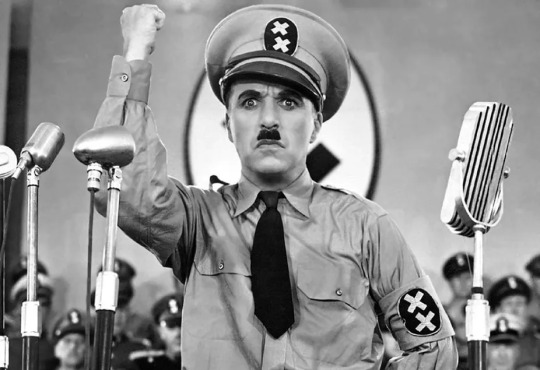
1) Fascists don’t believe in social mobility. Capitalism core tenant is “social mobility’, that somebody can work hard and become a billionaire, blah blah blah. Now this focus on social mobility is and always has been mostly a lie, but even rhetorically capitalism values the notion of social advancement. fascists do not, in fascist ideology, your birth determines your place in the world, and is part of a “natural order”. The only way to improve yourself is through war, and even that is more fulfilling your existing destiny rather than creating your own. Thus Fascists despises any form of social advancement outside military leadership, which is a major reason why they hate liberalism, socialism and communism, but its also a reason why they hate capitalism (though they usually prioritize the left wing ideologies first). This is even more true for them when somebody they think is “inferior” advances ‘above their station. Fascists aren’t aristocratic, but they hate capitalism for much of the same reason that the feudal aristocrats and monarchs hated it. It brings change and challenges the caste system

(Speaking of which)
2) On that note, capitalism is rarely…ideologically racist. Now capitalism is racist, it promotes and enforces existing racial hierarchies, and much of the damage of colonialism can be laid at the feet of capitalism. However capitalist ideology rarely buys directly into blood purity or “The Volk” style race theory that fascists so love. Capitalism in the US makes it super difficult for a black man to advance compared to his white counterpart, but if a black man does manage to become a billionaire, capitalism is basically cool with it. If you look at a demographic breakdown of the 1%, it is mostly old white men (and almost all people who at least partially inherited their wealth) but it also includes a lot of non white people and women. its a minority and many of them come from dictatorships (Saudi Arabia, China ect) but the ‘richest people in the world club isn’t entirely monochromatic. To leftists, this doesn’t seem especially impressive, but to fascists it is way too much diversity. Because capitalism is at its heart…amoral, the system will keep going even if the 1% are majority non white, gay or women, but to fascists that is terrifying. they barely tolerate capitalism because the ruling class are mostly straight white dudes, but the thought of the ruling class not overlapping with their belief in racial science to them is terrifying
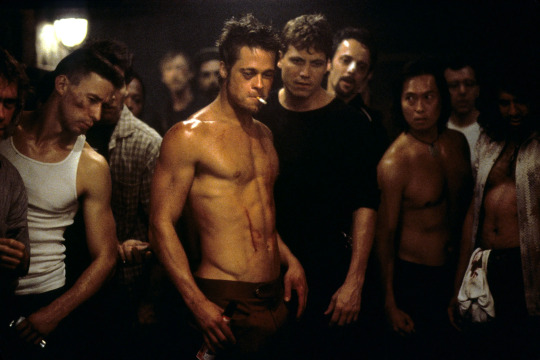
3) Capitalism is ultimately an amoral system. It doesn’t really believe in a larger ideology beyond “make a fuck ton of money” and “innovate…somehow.” It does evil things because it believes that doing so will make them money, if doing the right thing will make them more money, they will. Capitalism is just an utterly mercenary ideology, and will gladly pretend to support progressive causes if it turns a profit. Again, leftists (rightly) aren’t big fans of this, but fascists hate it for the same reason we do honestly.
Like you know the whole “Woke capitalism” thing that gets leftists worked up. its doing something good but you know they don’t care and so they will abandon us the moment they feel like they can get away with it and all that. That is how fascists feel about the racism in capitalism, they like it but because it is not ideological, they don’t trust it.
Again this seems weird to leftists, but yes, fascists don’t like capitalism because it isn’t racist enough. We tend to interact with capitalism more than fascism, so people often don’t realize how much worse it can get

4) Capitalism doesn’t care about the spiritual, except as something to sell. ironically for all the hatred capitalism and communism have for each other, the two ideologies actually share a lot in common, they are super secular, materialist, and basically assume that everything in the world is nothing more than simply products. Communists and capitalists disagree on what should be done with these goods, but neither of them believe there is anything beyond this world.

Fascists utterly reject this world view, they hate it, they hate it with a thousand suns. I know that there current image is a sort of ironic racism chanboard nonsense, but in terms of their actual beliefs, Fascists take everything super seriously. The entire argument of Nazism is that they value symbols more than actual human life, and they are fiercely attached to various “spiritual” political issues even if they are officially atheists. I mean capitalism doesn’t give a damn about “degeneracy” because it isn’t actually a material thing, its just an aesthetic preference, there is no like “measurement” of degeneracy. same goes for honor, the family, purity, and their approach to art, fascism is in many ways about finding meaning in otherwise mundane things. So at fascist rally to them is this transcendental almost religious experience, while a capitalist would be more It interested in trying to find a way to make money off it. Fascism is a highly Romantic movement, which doesn’t play well with the cynical wordy perspective of capitalists, who believe in nothing.

Fascists also dislike aristocracy, but they love the myth and romance that is necessary for aristocracy and monarchy. They basically want aristocracy of the skin.
5) Fascists kinda…hate the idea of money. Like Capitalism emerged from the merchant classes and is basically came about with the argument “all of your aristocratic concerns over honor, titles, and god are stupid, what matters is who has the money and how you use it” And Fascists just hate that worldview, one of their defining traits is their love of war and conflict, in fact fascists prioritize war over almost everything else. It has been noted by smarter men than I (I recommend Ur Fascism) that Fascism is basically a death cult, they want effectively an endless war that they can die gloriously in destroying their enemies.

Consistently by the way, fascists will prioritize destroying the people they see as inferior over securing their own material best interest. Hitler probably could have run his dictatorship in Germany on his own for quite a long time and lived in luxury, but he wanted a giant war because that is what they care about.
in fact actively seem to indulge in self destructive short term ideologies. The Nazi economic policy was an absolute joke, with the economy serving as nothing more than something to keep the war effort going. Stephen Miller, the most fascist like person in trump’s administration, is hyper fixated on a brutal immigration policy, even though it actually hurts the economy. Fascists oppose freedom of movement and free trade, even though those are policies neoliberal capitalism supports. The reason is that Fascists value the preservation of “The Volk” over profits, and would rather their people suffer than have to live alongside other races (these people are deeply stupid)

6) Fascism doesn’t enjoy having fun. I know for most of, our experience of capitalism is misery as we work, to earn the right to work, to earn the right to give, ourselves the right to buy, ourselves the right to live, to earn the right to die. However the way that capitalism sells itself is basically “buy lots of shit and that will make yourself happy”.
Fascism doesn’t really…like being happy. As i said before, they like war, they like conflict, they like having an enemy who they can destroy. To fascists, what matters most is how you kill and how you die, rather than enjoying life. Fascism is about fetishistic death. Pink Floyd was right that Fascism is almost a form of intellectual suicide.
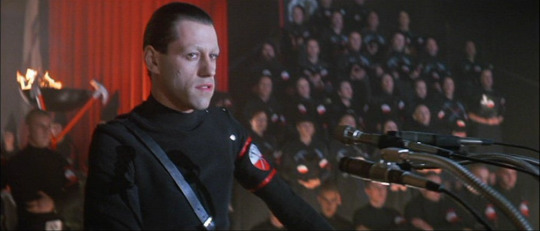
If you look at Japanese fascism, there is big fixation on aesthetic purity focus, with the only thing mattering being conflict
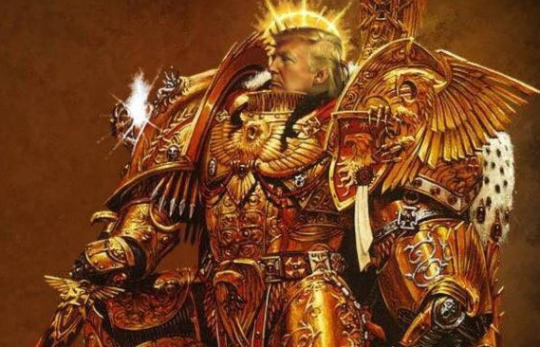
7) Capitalism tends to value the urban, the industrial, and the technology, while fascists, like the Confederates before them, are enamored with the rural and the pre-industrial. This might seem surprising, but there are a lot of fascists who are into environmentalism, Nazis Germany was one of the first states to pass laws banning animal cruelty and limiting smoking. Fascists are really into this sort of “Clean earth, clean people’ aesthetic which always serves as the breeding ground for cruelty.
8) Capitalism tends to be leery of state control and fascists are all about that shit
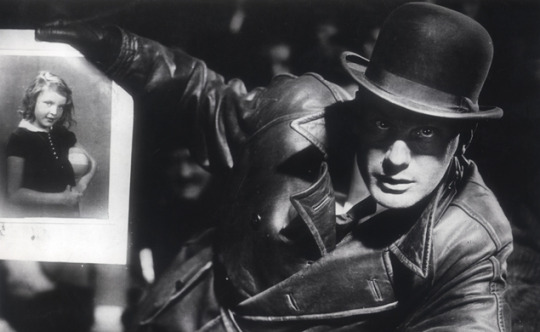
9)Finally….we need to be frank. A lot of the ways we talk about anti capitalism actually can fit really nicely into the antisemitic narratives that so dominated fascist thinking.
so the Marxist says
“Hey the entire world is controlled by a tiny elite of rich greedy parasites who are making us fight each other in order to benefit themselves”
And the Fascist says
“Yeah….they are Jewish”
its actually really hard to depict the rich as a class without accidentally wandering into anti Jewish sentiments, because the last 2,000 years of anti Jewish racism has been about creating conspiracy theories where they secretly control the entire world. A lot of what fascism does is taking existing issues of capitalism and being like “oh yeah…that is the fault of the Jews. Or migrants/African Americans/Muslims/feminists ect. Gamergate is a good example of this, they are pissed at corporations, but they blame feminists rather than you know…the inherently predatory nature of capitalism. Many of the things we don’t like about capitalism are things they also don’t like about capitalism. This is a major thing they do in terms of recruiting, they focus on getting people pissed at capitalism but then make it be secretly run by Jews rather than you know..Jeff Bezos.

(nazi properganda and below are soviet Images of capitalism )

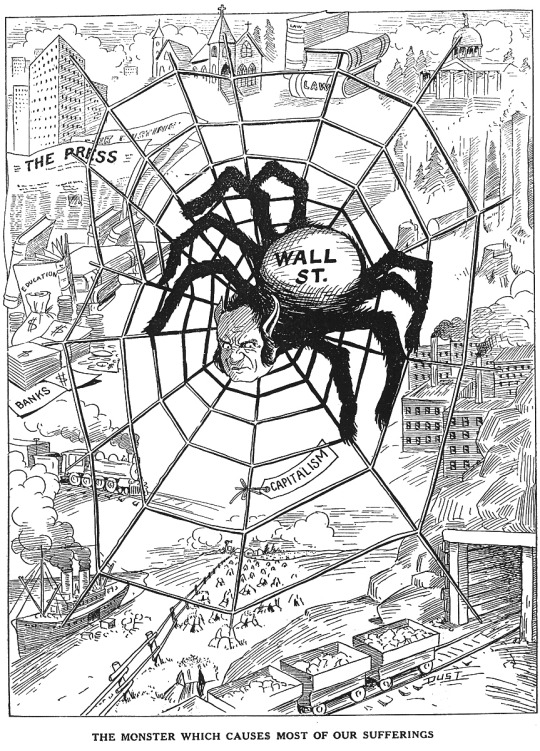
(and sometimes both)

This is why btw, I am less anti capitalist than most leftists, because talking to fascists makes you appreciate things about them. Hitler was destroyed by both a communist dictatorship and a capitalist democracy working together.
Its worth noting that while fascists do hate capitalism, they hate socialism a lot more, and tend to ally with capitalist to kill leftists, as we see from the Weimar Republic. Fascist are often ok with certain types of corporate authoritarianism, but in the same way the left can be ok with somebody like Obama.

(Frank Miller’s Batman is if Libertarian and Fascism had a baby)
The lesson I would take from this is that just because somebody hates the thing you hate, doesn’t mean they are necessarily your ally, they might in fact be even worse. Yet another reason to distrust the dirtbag left
#ask EvilElitest#Fascism#capitalism#adam Smith#Communism#Marxism#Nazism#Political theory#Liberalism#Imperial Japan#Nazi Germany#Fascist Italy#Alt Right#Gamergate#Dirtbag left
83 notes
·
View notes
Text
Orion Digest No. 3 - The Modern Era of Nationalism
The greatest development of the last few centuries, standing above the Industrial Revolution and the technology of the 20th century, is arguably the Age of Enlightenment spanning the 17th to 19th centuries. In an era of kings and traditional power, people thought critically about how we had grown to view the world, both scientifically and politically, and realize that we didn't have to stay frozen in a gridlock of monarchial power.
Democracy had existed for many centuries, but it hadn't been implemented in a widespread fashion since the fall of Rome, leaving family bloodlines and single personalities to dominate the world, with only perhaps councils to advise and aid royalty in some select places and times. However, with Enlightenment era thinkers studying the philosophy of their ancient counterparts, they began to suggest the possibility of a full scale democracy in the modern era.
Some of the central political ideas from the earlier Enlightenment years concerned the relationship between citizens and their government, with several thinkers claiming government to be founded on the "consent of the governed." As powerful as government is in the lives of citizens, it is ultimately a system designed to serve the citizens' need for organization, not the other way around. Thinking back to the basic concept of society, government is not above the mechanical workings of a nation - it is yet another cog in the machine, and its power is a tool for its job, not a reward to be sought after.
The natural progression of this idea of an ideal government that serves its people was a reflection on the government systems in play at the time. If a government was not acting as it should, and was a hindrance to the rights and prosperity of the people, what should be done? With the analogy of a machine, any cog that directly prevents the machine from running is faulty, and if a government is faulty, unlike people, it can be replaced. The concept came about that, if a government does not have the consent of the governed, it could simply be overthrown and recreated to match the people's desires.
Naturally, if you happen to be the one in power, this is a very dangerous idea to you, no matter how true it is. Unfortunately, most leaders respond to revolution not by trying to understand their own mistake, but by trying to discourage the people from expressing themselves. In a democracy, where people can decide and bring about change themselves, this is not a problem, but in the kingdoms of old, inadequate leadership had no natural authority but itself to amend the issues. The king only answered to the king, and that was that.
With the North American colonies revolting in 1776 and the people of France revolting in 1789, two landmark examples of striking back against a monarchial system entered the world's consciousness, and showed many nations that there was an alternative, which would spark an overall trend towards democracy over the next few centuries. Revolution wasn't a new invention by any means, but this was the first time for many that the idea of the people having power over the government was in display in full force.
However, this wasn't the only major idea about systemic upheaval that rocked the world in this Age of Enlightenment. You may notice that my definition of the Age of Enlightenment's time period conflicts with the usual established version by history, and that is acknowledged and intentional. Around the latter half of the 18th century and the beginning of the 19th, technological and economic development led to what is known as the Industrial Revolution, which created machines and systems of organized labor that increased production rates exponentially and put masters of craft at the top of the food chain in the new economies that emerged.
Instead of the mere aristocrats of 'old money', the Industrial Revolution saw businessmen of 'new money', the wealthy who saw a chance for power and grasped it, taking any opportunity whatsoever to take it and hold onto it. Just like government in the beginnings of society craved power at any cost, so did the leaders of these markets, using dubious practices and dealings to skyrocket their wealth upward and upward. A working class was created that now were faced with a problem beyond government - their very livelihoods were not subservient to the whims of corporations, and that was not something often regulated by the government.
Enter Karl Marx and Friedrich Engels. I will not talk at length about the theories of Marxism and its associated branches; at least not here, not now. But to summarize, these two thinkers and writers approached the growing system of capitalism with a theory of cyclic power balances and class warfare that had flip-flopped throughout history, and declared that the only way to combat corruption in the economy was to give the power of production to the workers who did the actual labor, rather than leave them out of the decision-making progress.
This theory began to catch on in the next century and a half, and still persists today. Workers, after all, are at the mercy of their employers when it comes to what to produce, with little options outside of that for either making money or purchasing necessary goods and services. But perhaps now that I have introduced the theory of revolution and capitalism, I should save the rise of communism and the corruption of modern democracy for the next issue. I will write more in this coming week, next time on the 20th century, but not at length about the events, but the basic political theories that emerged from its numerous wars.
- DKTC FL
#orion#sword of orion#nationalism#karl marx#friedrich engels#marxism#socialism#capitalism#workers#workers rights#enlightenment#industrial revolution#history#orion digest#political#political essay#essay
3 notes
·
View notes
Text
About global poverty:
At least where I come from, there’s a tendency to see local poverty (at least, uh, by people who don’t have personal experience with it) through a lens of mixed charity and contempt. With the exact mix varying by person. The spectrum runs from “what an irresponsible bum, clearly they can’t be trusted with money” to “oh what a poor unfortunate victim of circumstances, I as a certified Good Person want to do something to help”, only sometimes bothering to stop at respect and genuine empathy at any point on the spectrum.
Let alone an analysis of the social and economic and political forces that create poverty and a sense of being able to change those forces through activism. “Helping the poor” is primarily seen as a charity thing and only secondarily as a political thing, and while that applies more to conservative than liberals it does apply to liberals as well. The idea that poor people have a right to not be poor — not just a right to not die, not just a right to basic necessities, but having a right to a reasonable amount of money that they can spend however they choose, the right to things without someone else controlling what those things are and how they’re used — is an exceptional one.
The idea that the best ways of helping poor people all involve giving poor people resources and letting them decide what to do with them, is rare. Most charity comes with lots and lots and lots of strings attached, most government programs come with lots and lots and lots of strings attached, and in both cases a presumption that poor people know less about how to live efficiently on little money than affluent people.
And when people from my social location learn about global poverty, we naturally apply the same lens. Poor nations, like poor people, are either governing themselves poorly or unfortunate victims of fate.
History and colonialism and imperialism and genocide and land theft need not play into it.
Raising awareness of global poverty in absence of raising awareness of colonialism, gives people from affluent nations entirely the wrong idea. It makes people from affluent nations think the solution must be charity or foreign aid or externally imposed austerity measures (because poor nations being poor is evidence that they can’t handle their own money) and not...idk decolonization or something. Something political in nature.
Something that starts with people in impoverished nations actually having control over their own affairs.
#long post#political#global poverty#commenting on without reblogging#classism#charity#globalization#neoliberalism#austerity#colonialism
6 notes
·
View notes
Text
Just ‘cause we can, does that mean we should? - An Altered Carbon (S1&S2) Review
Stories of immortality, the fountain of youth, and shapeshifting are throughout our stories. The Picture of Dorian Gray by Oscar Wilde explores the idea of staying young and the corruption of the soul. From Bram Stoker's Dracula to every other vampire story told we see those ideas played out repeatedly. These ideas even come up in folklore from around the world. So needless to say, humanity has always wondered about immortality, youth, and shapeshifting.
Before we start, I have some questions for you. You don't need to answer them, instead, think about them. I mean really consider what it would mean.
What if we could live forever? If death is a part of life, and death is removed, is that really life? But what if there was still a possibility of death, but could technically (under the right circumstances) live forever, would birth and eventual death even matter? What if we could change our faces? Our bodies? If we can change our bodies, should we still worry about illness and disease? If we can change what we look like and we can live forever, does money and power still dictate us? What would humanity be like? How would we change with time as a species? As individuals? Would it be worth it? Does anything matter if our physical does not matter? Just because we can, does that mean we should?

This is Altered Carbon's universe. Humanity has moved beyond Earth (in fact, I think Earth is mentioned only once... and it's pretty far into the series) and we have found a way to become basically immortal. Cool, right?
There are spoilers approaching. Get Ready.
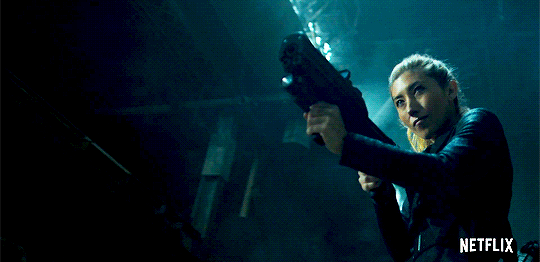
You're immortal, as long as you don't get your stack busted. The stack holds everything that makes up a person (experiences, memories, feelings, thoughts... everything). Stacks can be moved from sleeve (body) to sleeve with very little consequence. Well... That is if you're a Met, a rich person. And the poor... Well... If your stack is intact, you're still a live, but not physically there. Sometimes the poor can afford to rent a sleeve, but the series hints that even renting is a luxury. So what now? We don't die unless our stacks are destroyed, and we can look like anybody we want to look like. What do we do as a species?
Do we socially evolve? Yes and no. Yes: No longer is skin color a factor in a person's worth. Which, honestly, is really fucking awesome. You can go from being born Japanese/Russian to being a Caucasian guy to being a black guy. Since anybody can look like anybody, racism isn't a problem. Yay! Since racism isn't a problem, we see diverse families and relationships. So, point for AC! However, I did wonder what that means in reality. I'm sure there were people complaining about changing the main character's race from Asian descent to Caucasian. I understand why it is a problem when this does occur in other stories, but the changing of race is part of the series. It again, shows that in AC's universe you can look like anybody! I wouldn't have been upset if they stayed with an Asian actor for the whole series, but the dramatic change just drives home that race isn't important in AC.
No: Humans have not socially evolved as far as the economic classes are concerned. There is still a "1%" which holds all power and all the money and they still only care about themselves. The poor are nothing to them. There is no problem, unless it threatens them or their way of life. I'm glad this was in the series because it makes AC's idea of a future more realistic as a possibility for us. Granted, it's more than likely not going to happen, especially with the fact that we haven’t even been to Mars... Mars is 106 million miles away, but C'MON! In the 60s they thought we would have colonies all across the galaxy! Or at least on the Moon. In all honesty, I'm disappointed that we aren't even living on the moon in this day 'n' age. That's beside the point. The point is, the idea some people have that they are better than other people persist even in a universe where none of that should matter. Maybe the creator was hinting at the idea that greed and lust of/for power is a part of the human condition.
Has the human condition changed? No, besides the fact that in the previous paragraph I basically said it does not, there's another example. In AC, as humanity spread out in the galaxy seeking new home planets, we did what humanity historically does... We assumed we were more important beings. Killed indigenous life. And stole their secrets and their lands. Humanity might not be a lot of things, but we are damn predictable. Woo!
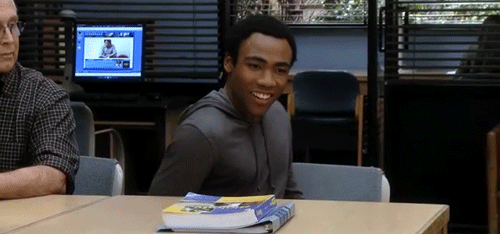
Oh. And by the way, just in case you were wondering, sex still sells. In fact, I'm pretty sure it’s one of the main industries on many planets in AC. And it's actually a large part of the first season's story line. Without it, there would have been no motivations for certain characters to do the things they did and the whole season would be like three episodes. With that being said, in season 2 there is less sex. So, at multiple times while watching season 2 I had to wonder, just for a hot minute, if the show's writers and creator added all the sex and nudity just to get their show sold on Netflix. Upon reflection, I decided that yes, some of the sex and nudity (seriously halfway through the first season you see multiple breasts, butts, vaginas, and 1 penis) but I also really think it was an important aspect to the story.
Are you guys ready for my opinion about the show?
If you haven't guessed it, I really enjoyed it!
I didn't think I would like it at first. Sex and nude bodies within minutes of the first episode of shows usually don't grab my attention. Like, I came here for a story! Not soft porn! (Which is why I never got into True Blood despite the fact I love vampiric stories!) However, I love stories that are intricate webs. Almost like spiderwebs. If you touch one thread, the whole web vibrates. And that is what Altered Carbon is. It is a complicated web of mystery, interesting characters, and emotions.
For some, it could be hard to get into because it is so complicated and honestly a bit weird, but if something isn't complicated and weird is it really worth the time?
I also really liked this show because the cast is very diverse!
So all those hypothetical questions I asked at the beginning are questions that I feel like Altered Carbon is trying to answer through the story of Takeshi Kovacs. He's been away from the world for more than two centuries. Hired by a Met to solve the Met's death, which is the main mystery and even though it seems like an obvious whodunit, it is more complicated than it seems. And so is Takeshi.
He's not just a fantastic martial artist and weapon's expert. He is a brother, a friend, and a lover. (And let’s be honest, crazy attractive no matter the sleeve!)
Thinking back, none of the characters are one dimensional. Each one has their own motivations, past, and does the one thing that is important in storytelling, each one grows (whether good or bad). I’ll do a bit about some of the characters, but not all.
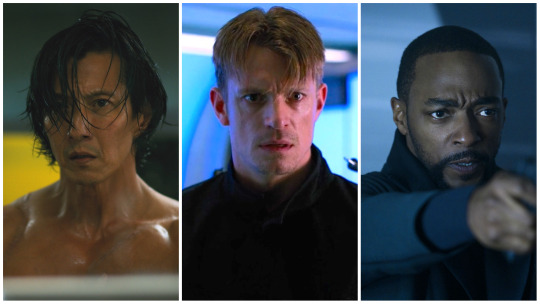
Takeshi Kovacs When we first meet him, he’s a dick that hallucinates. I mean, he’s always a dick, but we don’t know why he’s such a dick or why he hallucinates (my money had been on the drugs…). He just wants to find a place to lay his head, maybe get his rocks off, and drink. That’s all he is in most of the first episode. By the end of the first episode you’re left wondering who the hell this guy is! And why the hell is he such a good fighter even though he hadn’t been in the physical plain for more than two centuries! As the series progresses you learn bits and pieces here and there. By the end of season 1, you know who he is. He is Takeshi Kovacs, The Last Envoy.
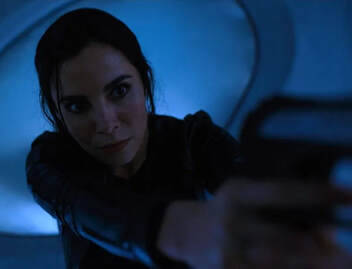
Kristin Ortega My first thought was either she needed to hop on that dick or go fly a kite. Honestly, I don’t like that that was my first impression of her. She grew on me a lot. In fact, her storyline brought the religious aspect into the story. If we can live forever, would God be okay with that? It was really interesting to me to think about that. Anywho, back to Kristin… There are times that I think her character gets away with more than she should, but again, it fits in well with the whole plotline of the show.
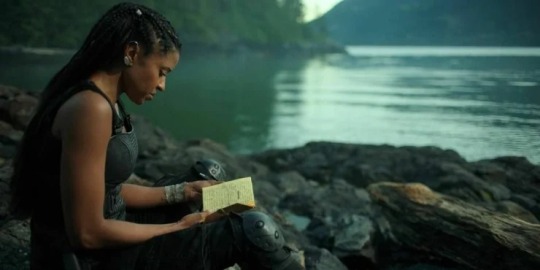
Quellcrist Falconer THIS BITCH RIGHT HERE. HBIC! UGH!!!! She is so cool!!!! I love this character so much! A little less in season 2 because she doesn’t come off as strong as she does in season 1, but it is explained why she’s not as boss bitch. Aaaannd, it’s understandable. But seriously! She is really really awesome! Leader of a rebel cause, extraordinary fighter, master of her world… SO GREAT. And honestly she has some of the best philosophical one liners.
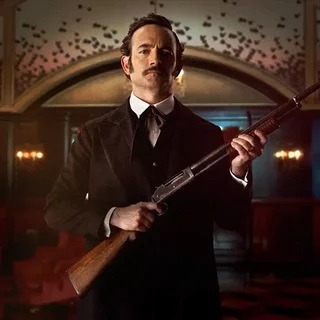
Poe Probably the most human out of all of them. I really enjoy the character. He’s sweet, kind, and smart.
Reileen Kawahara I’m going to let you decide. I haven’t decided for myself yet. Jaeger A fucking asshat. I’m just going to leave it at that. So, this is where I will stop (partially because I've been working on this for days and I just want it posted!) The main takeaway is that IF YOU LIKE STORIES THAT ARE DEEP, COMPLICATED, AND WEIRD WATCH THIS SHOW!! YOU WILL BE SO GLAD YOU DID! And please let me know what you thought of it! I would really love to talk about this show more! If I think of anything else to add I shall post again! Thank you!
5 notes
·
View notes
Text
Sept 16,2020
Hi! Welcome to my first journal entry. I have chosen Tumblr blogs as the medium to present my responses because I like that I am able to write long posts. It also seems like the most appropriate platform since this is a blogging site, which is technically an online journal.
For our first assignment, we were separated into groups. I was placed in group 4 along with Jude Buendia, Faith Santos, and Rj Anonas and together we were tasked to read 3 articles.
Quebral’s Primer- I found it very general at first, but of course, it is only a primer. Nevertheless, I felt like many topics here could’ve been explored more such as providing actual examples of said topics (development communicator, maintaining consensus, sustainability, etc.) But I liked how it was written in an easy to read manner, which is accessible to anyone. I also like how she recognizes the value of different kinds of media and how they have equal but different roles in communication. Many like to put down social media, but she did not and instead recognized how it was vital to organizing and information dissemination.
Chatterjee’s Article- I think I preferred this article more, maybe it is simply because I am biased to post-colonial studies as a Literature major. I definitely liked how he recognized the role of colonization in development. But also, the difference between the two is how he stressed providing the basic needs of people before economic growth, which signals to me that economic growth is dependent on the welfare of people. Hence the importance of a bottom-up approach. Also, this is the first time I have every learned of “Development Journalism” and I am proud that it was coined here in the Philippines. Such an interesting read for me! I’d definitely love to learn how influential this is in the coming weeks and how it played in Martial Law.
As a whole, I was amazed by the amount of thought and effort was put into Development Communication. I very much appreciate the way they combined art and science to create change. Reading these articles was like a breath of fresh air because I have realized how apathetic then other ideas, papers, and movements are towards to welfare of underdeveloped societies. Development Communication is clear in what it wants as a main goal: change, not much could be said in other disciplines.
As an English Literature major, I also appreciate how much the authors valued the role of communication in fostering development. Many like to oversee the importance of communication and language in everyday life, but they fail to understand that everything around us is a product of language. I look forward to learning how communication could produce such great change and how we could use it to our advantage.
I also loved how majority of the papers were written why citizens of actual developing countries, the idea of Development Communication remains consistent. This signals to me that the idea truly is made for developing countries and by the people who actually experience what it is like in these societies.
However, what I would’ve like to see or learn more, especially from the first two articles, is how neo-/colonization is a big factor to the underdevelopment of countries. I’d like to know the answer of my question: how can the third world develop despite Western ideology making it difficult for us to survive in our own terms? Do we ignore such ideas or must we conform to them?
In line with the previous paragraph, I also want to question why much of development is placed on the people themselves? I understand that it is to empower people and mobilize them, however, how can they succeed when the system is built against them? Shouldn’t the West, government, former colonizers, and upper classes have more roles in development since they are the reason why there is underdevelopment?
Furthermore, I would also like to know, in the Philippine context, what language must we use in Development Communication? These articles highlight the importance of dialogue as a vehicle for development. However, in many developing regions in the Philippines, English or Tagalog is not their first language. Yet, we are learning about Development Communication using these languages. How then could we create or manage dialogue despite this? Moreover, how can we disseminate information through mainstream media despite this? What reforms could we do to our systems of information to make it all-inclusive of different groups in the Philippines?
Anyways, I really enjoyed these articles and learned a lot from them. I look forward to what this semester has in store for us! I also look forward to learning what I could do to create social change!
2 notes
·
View notes